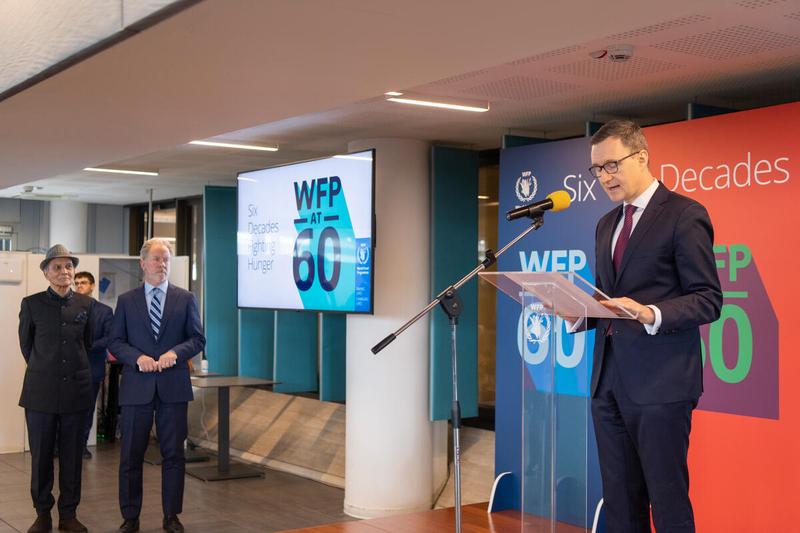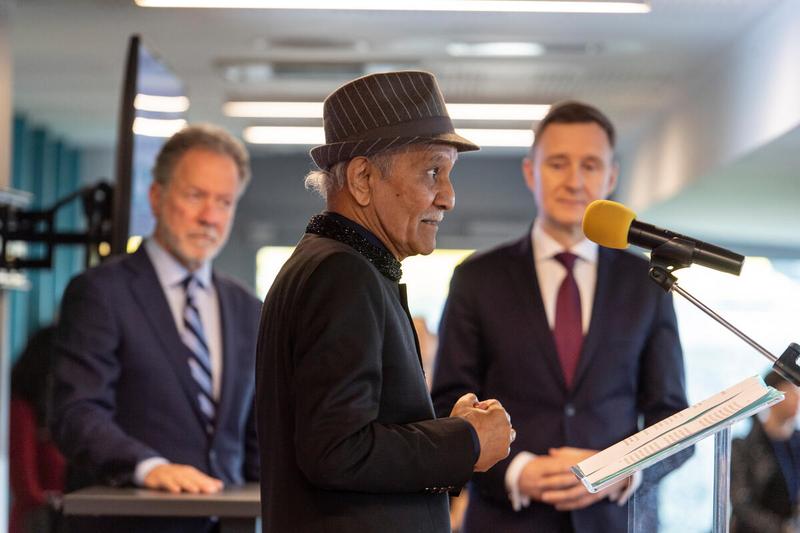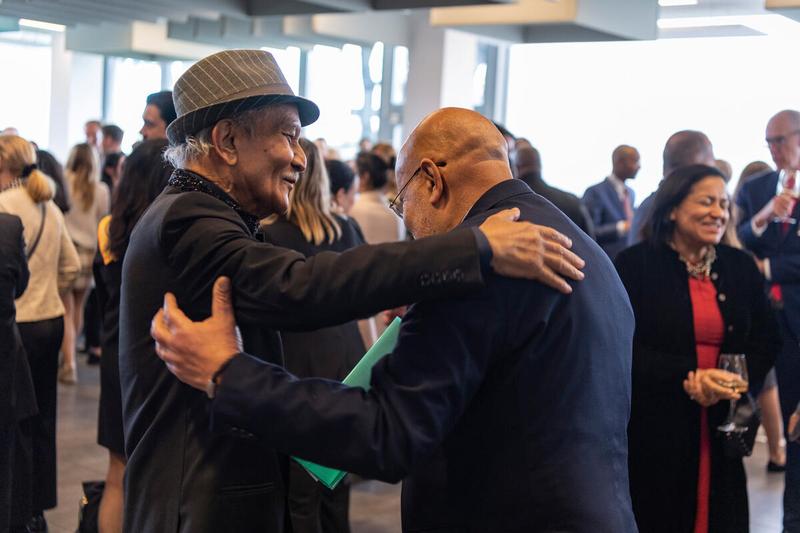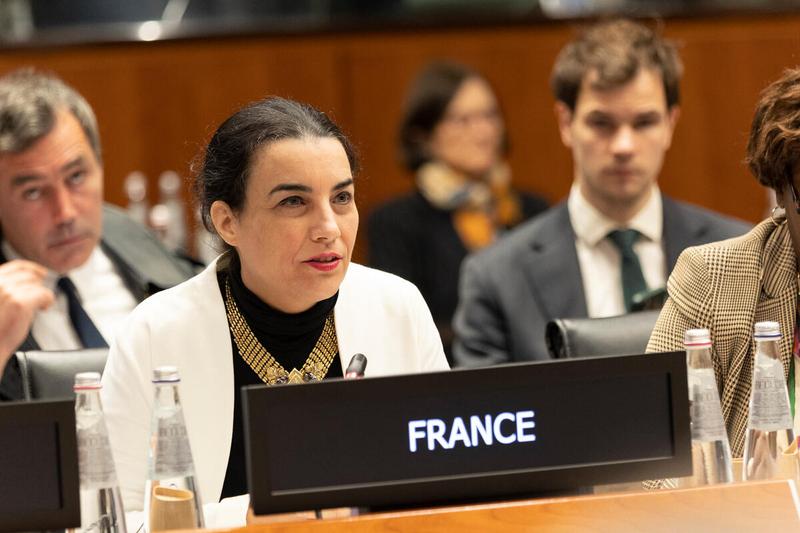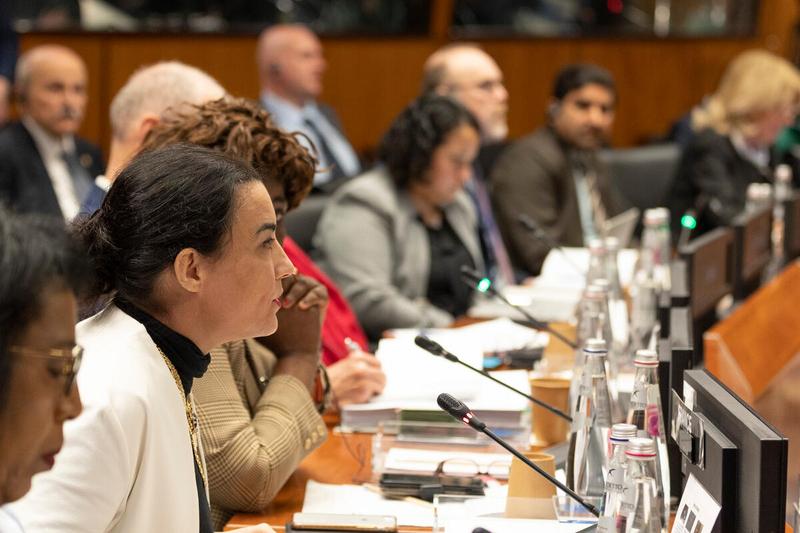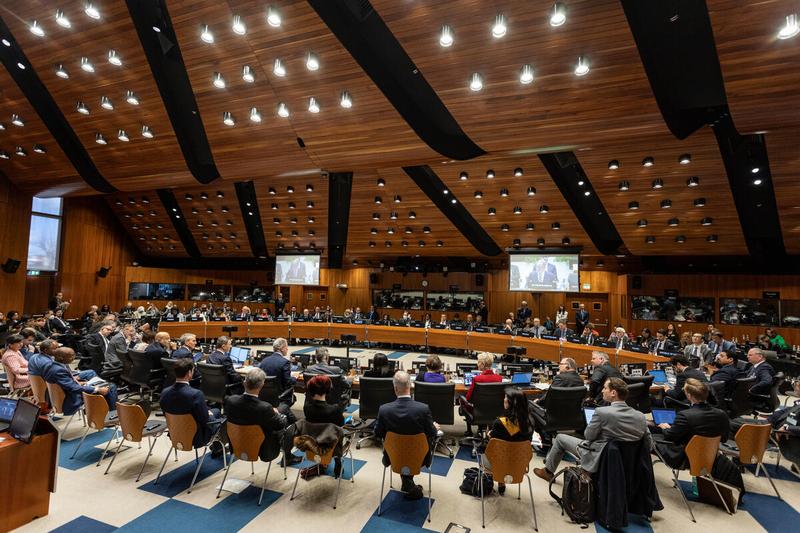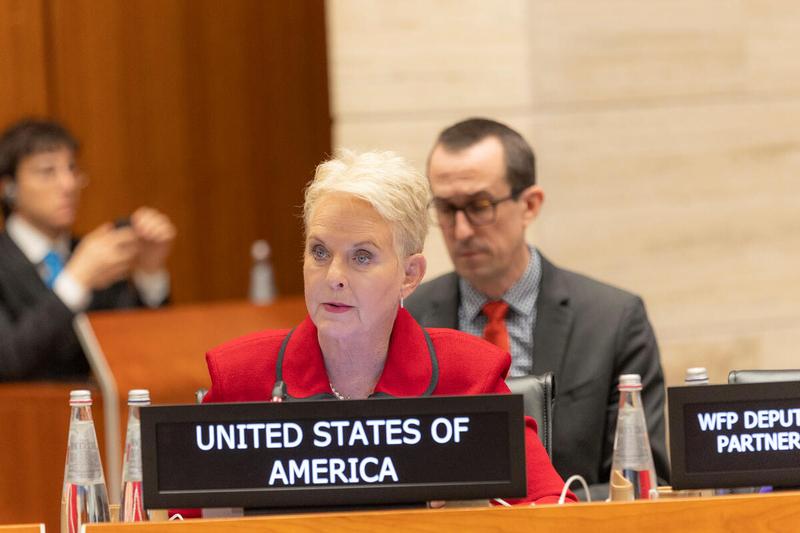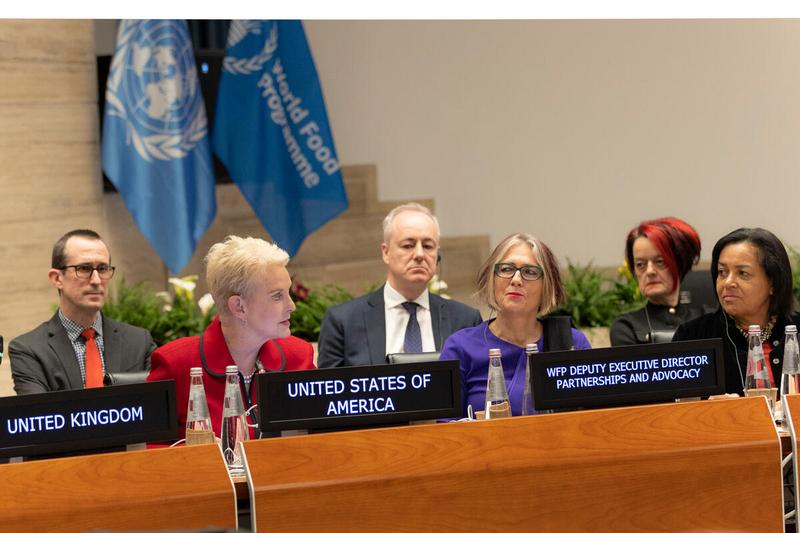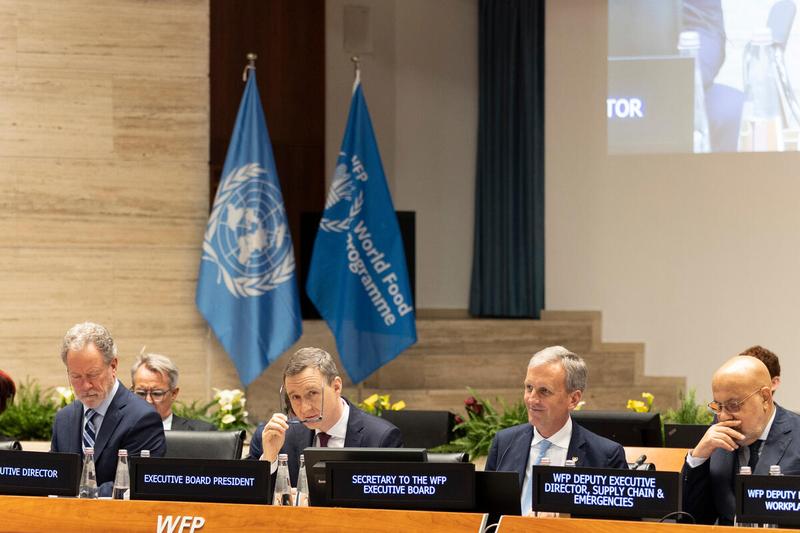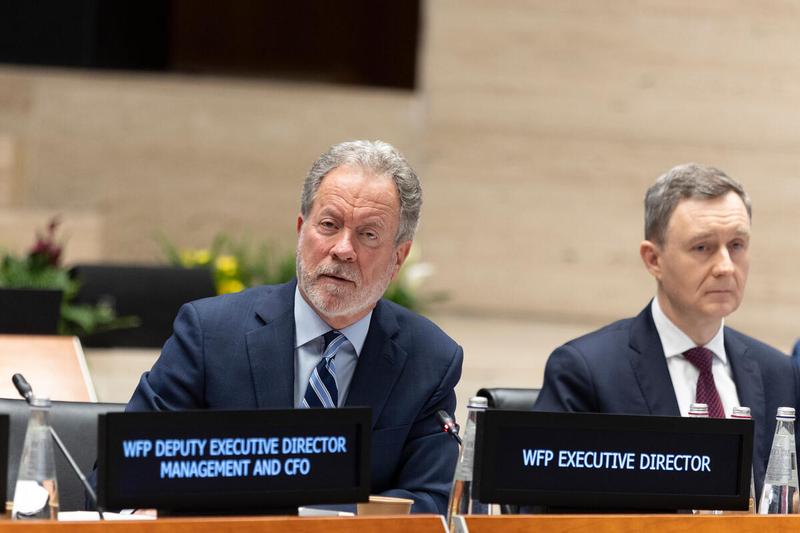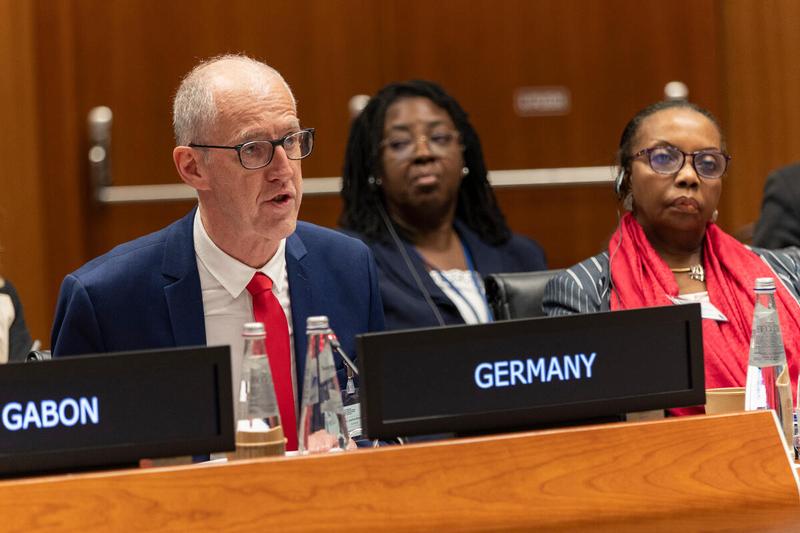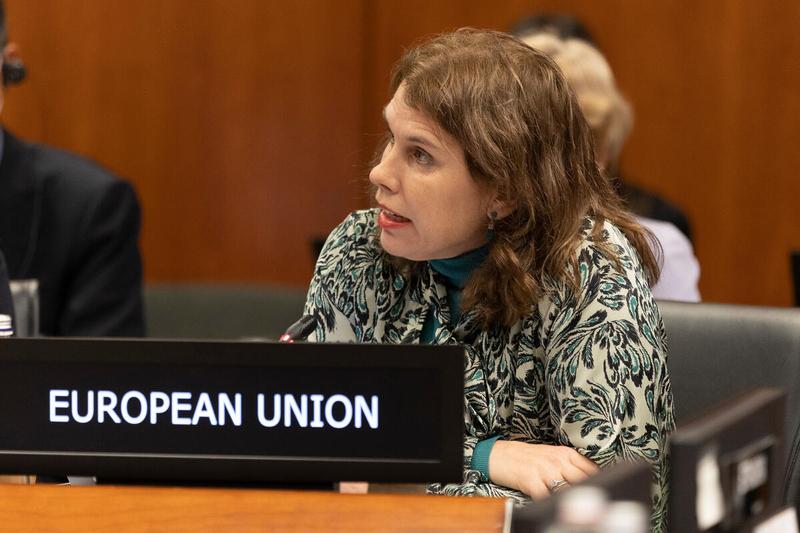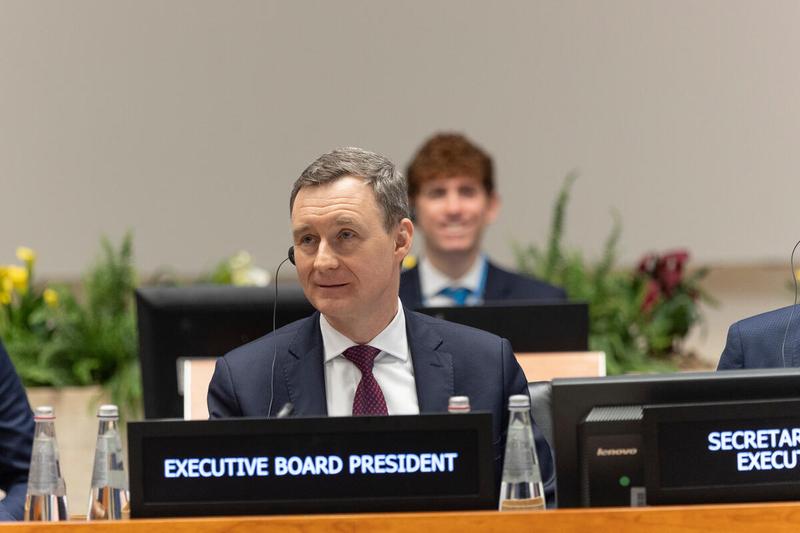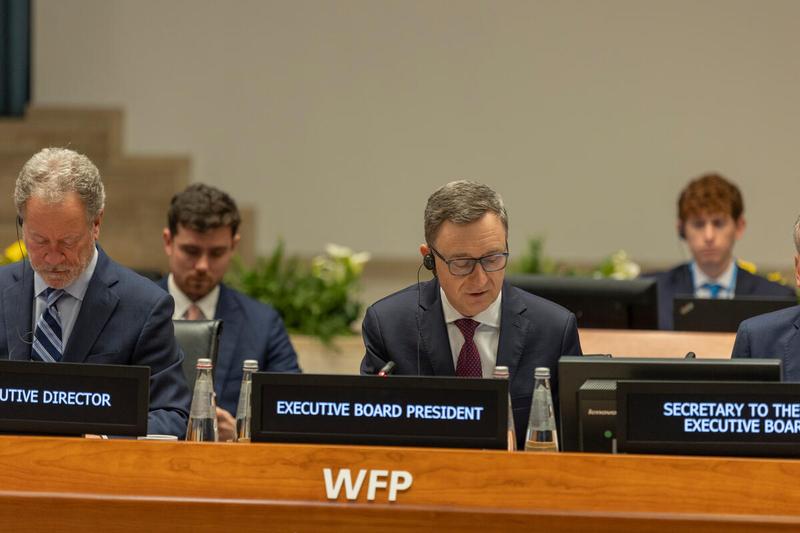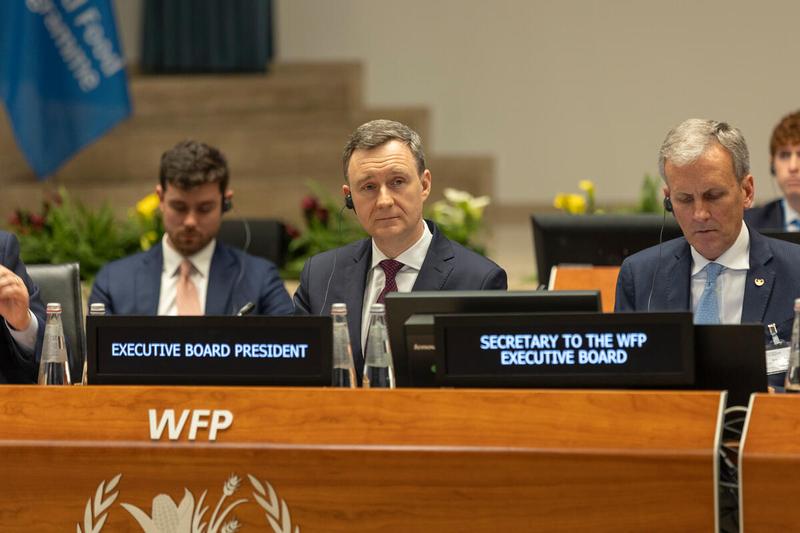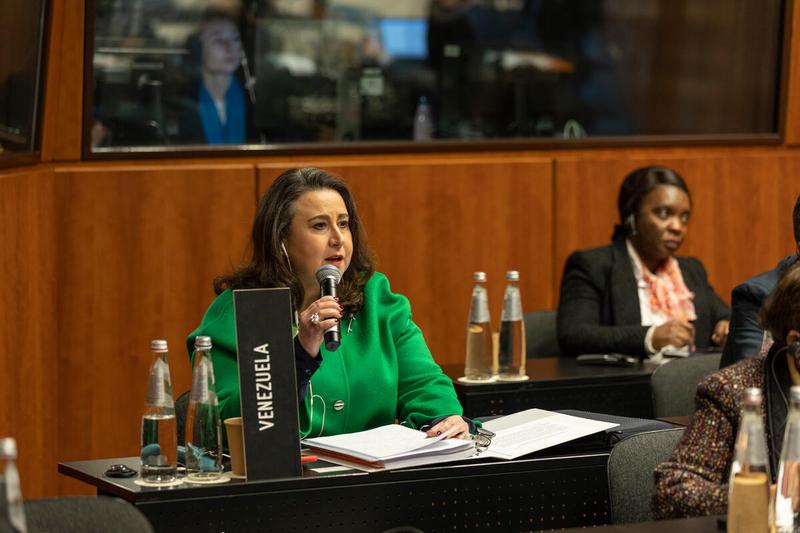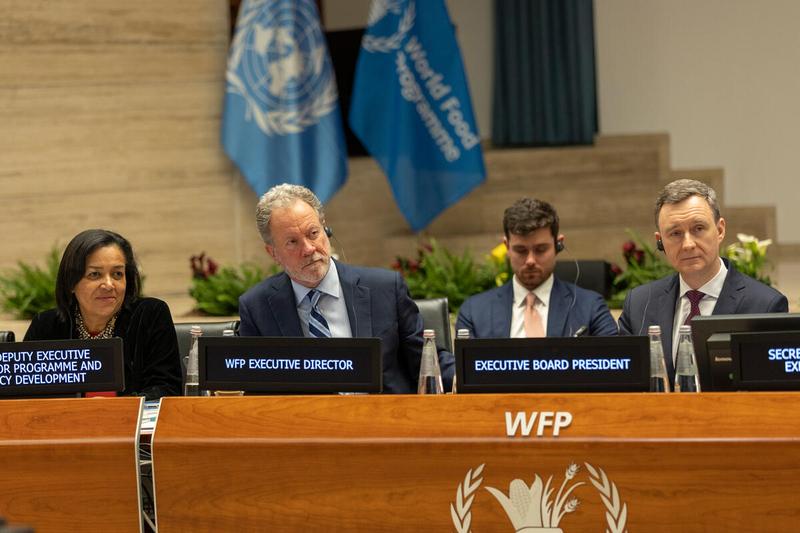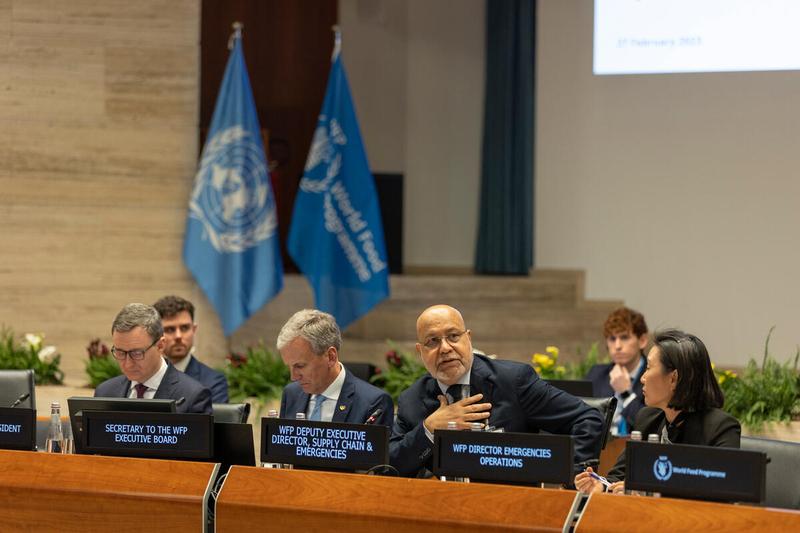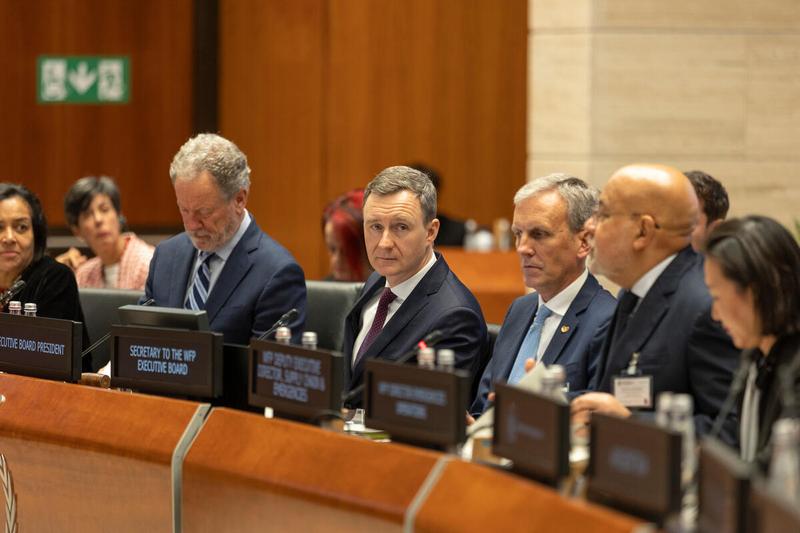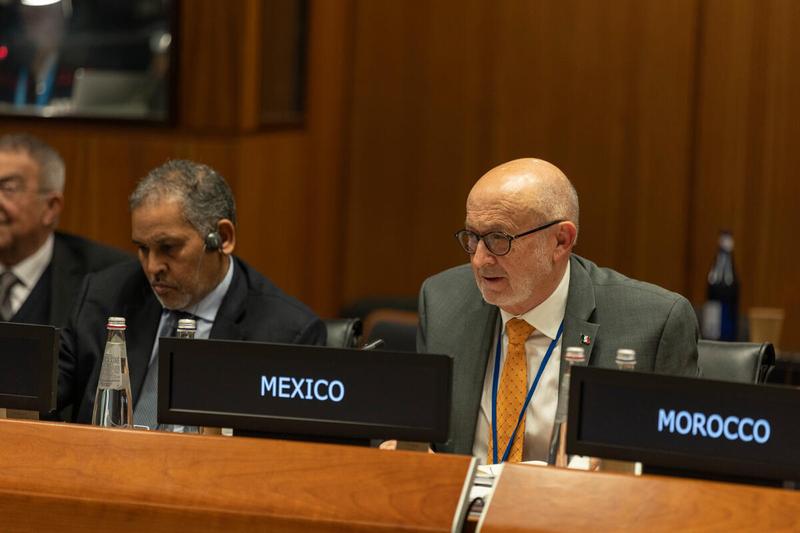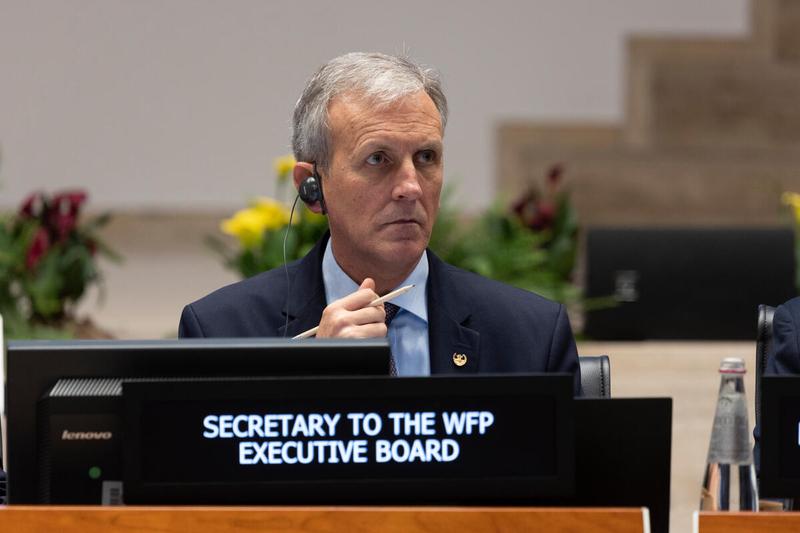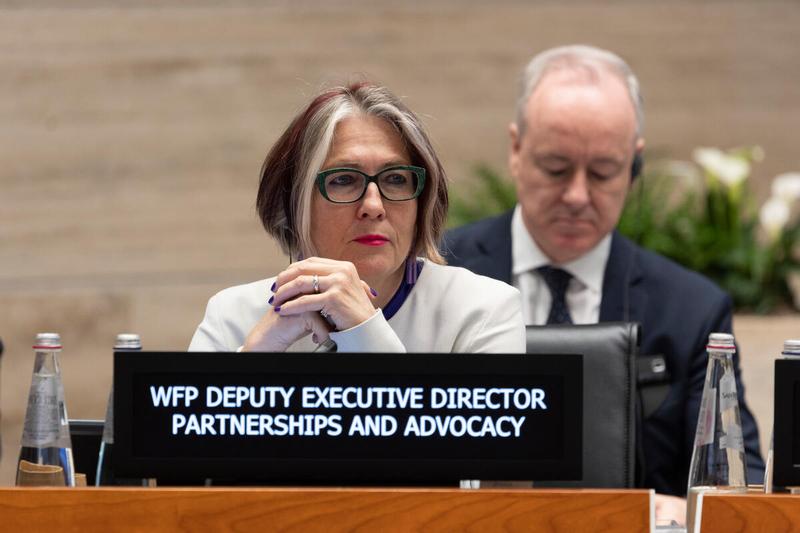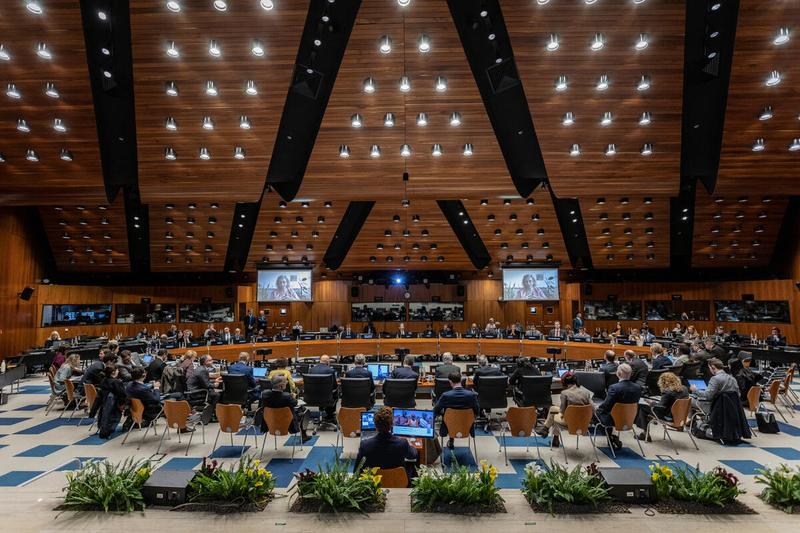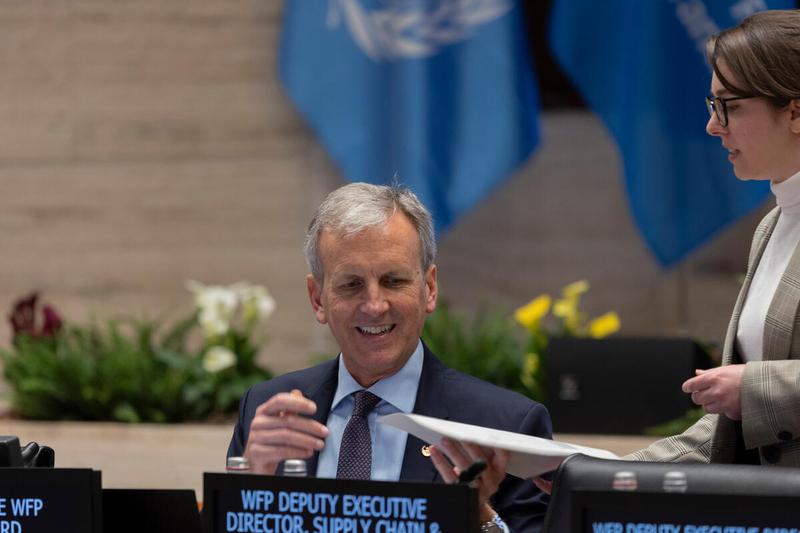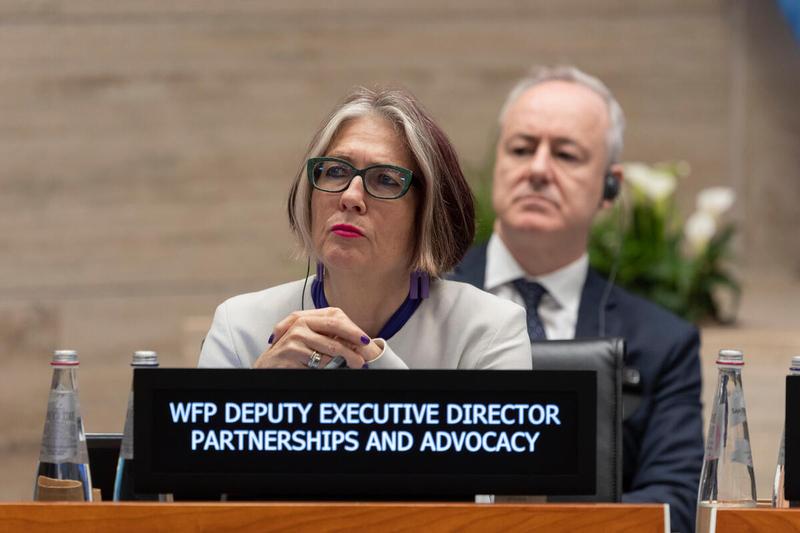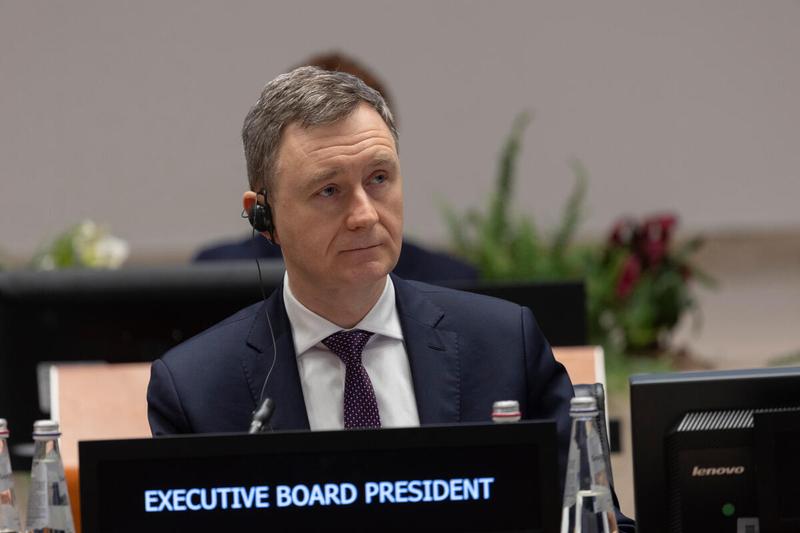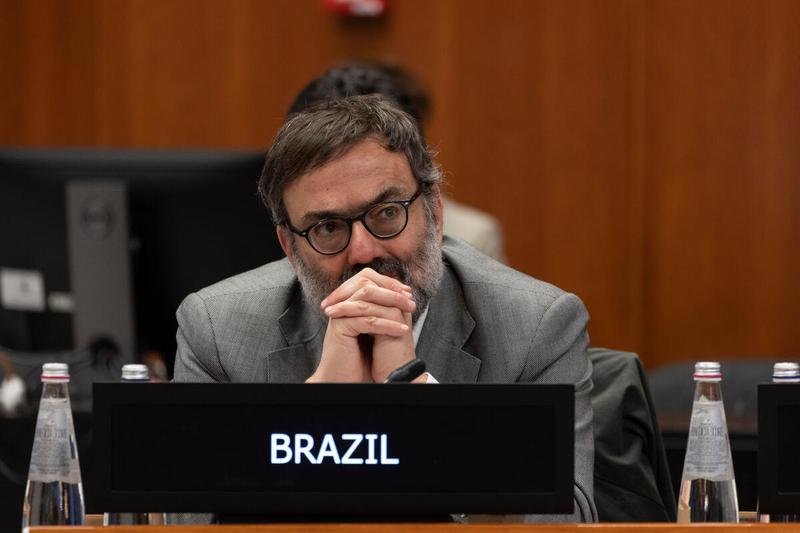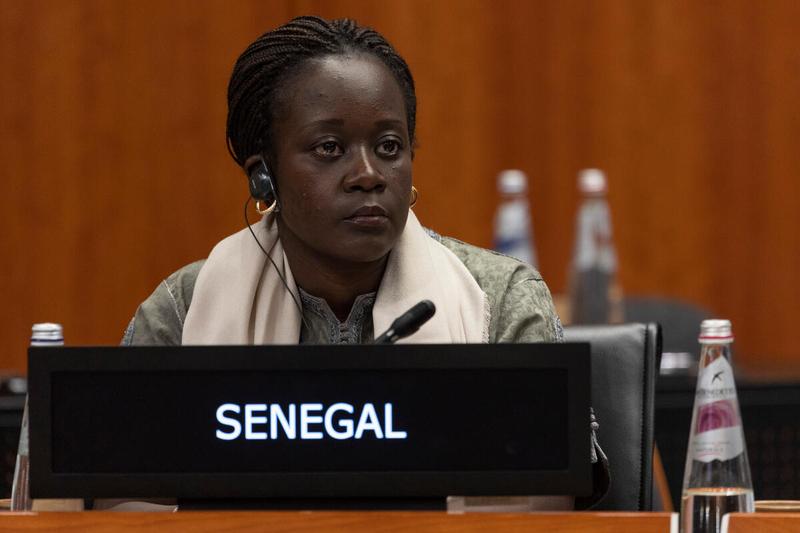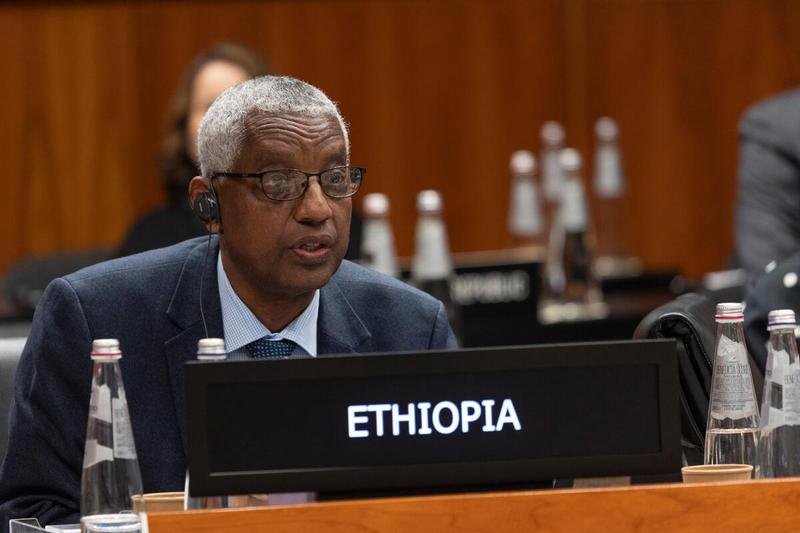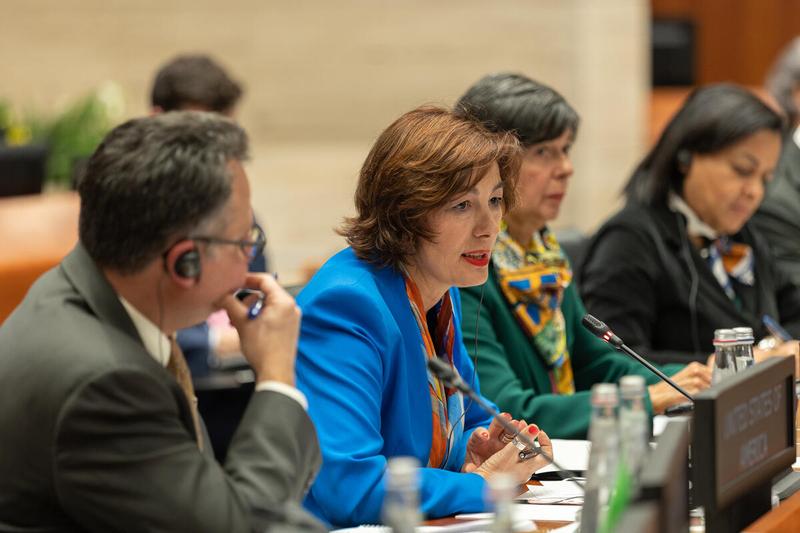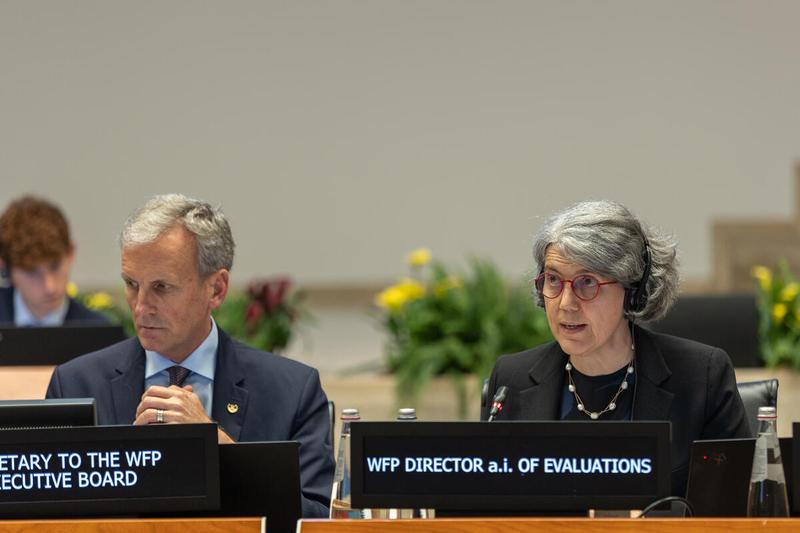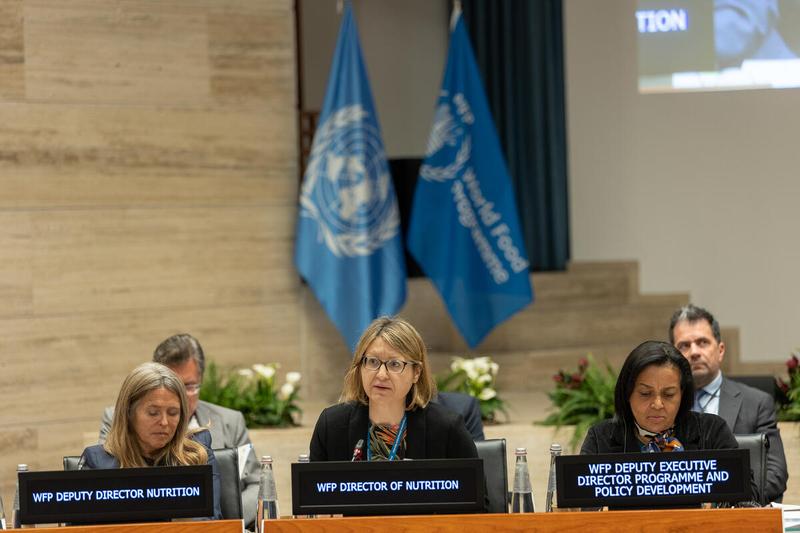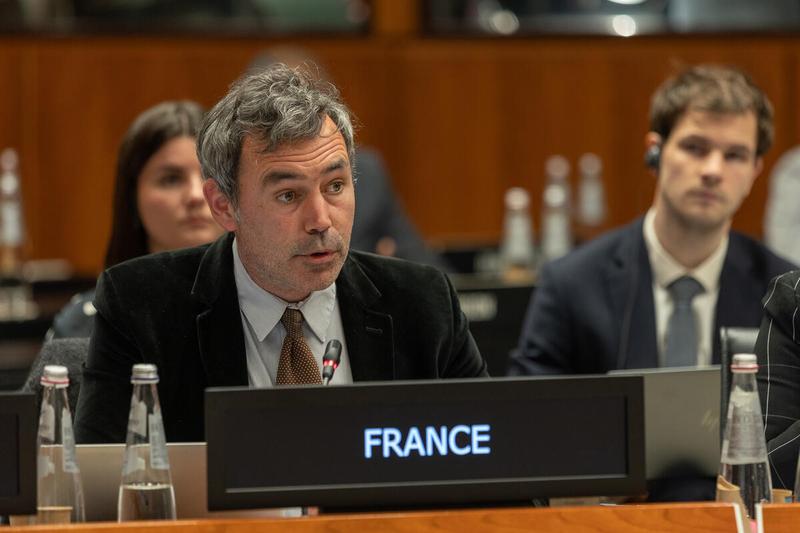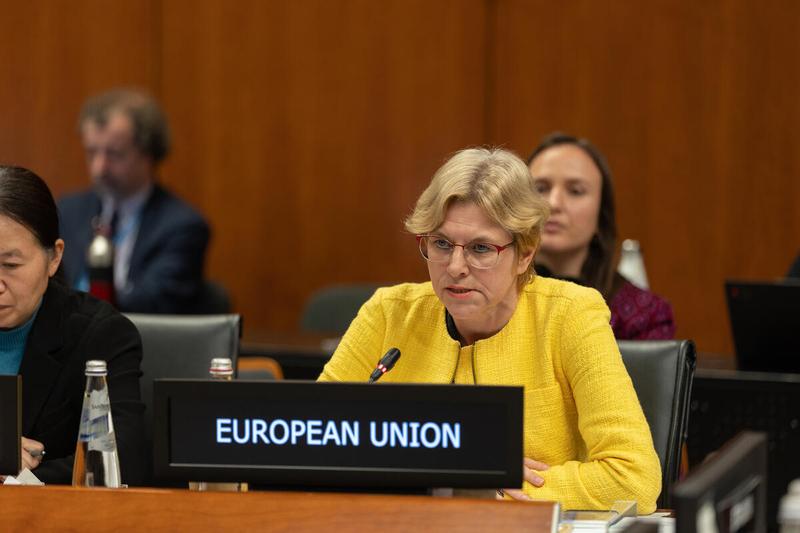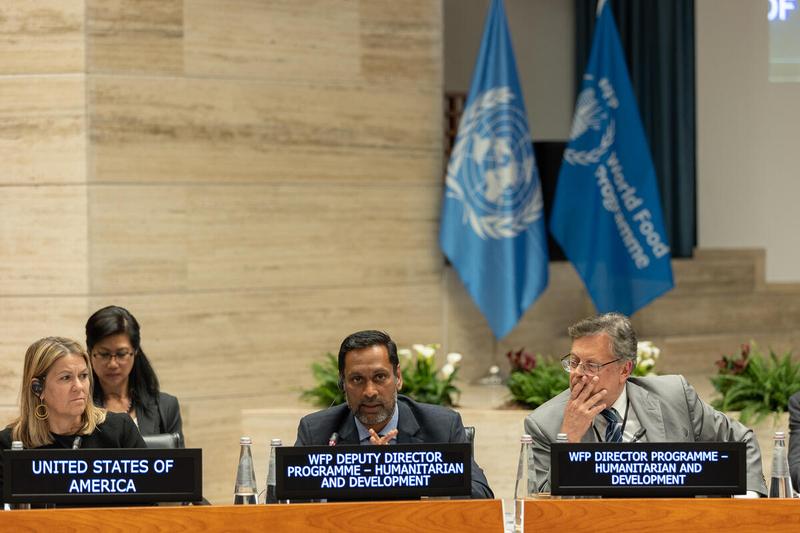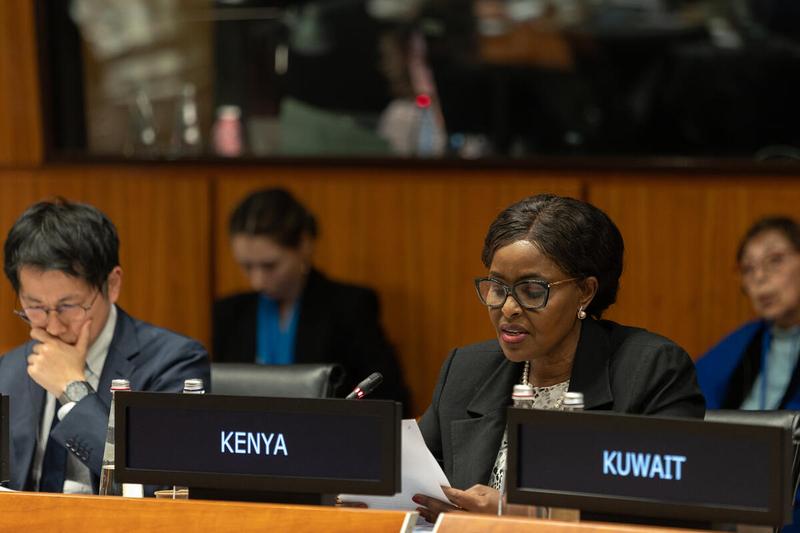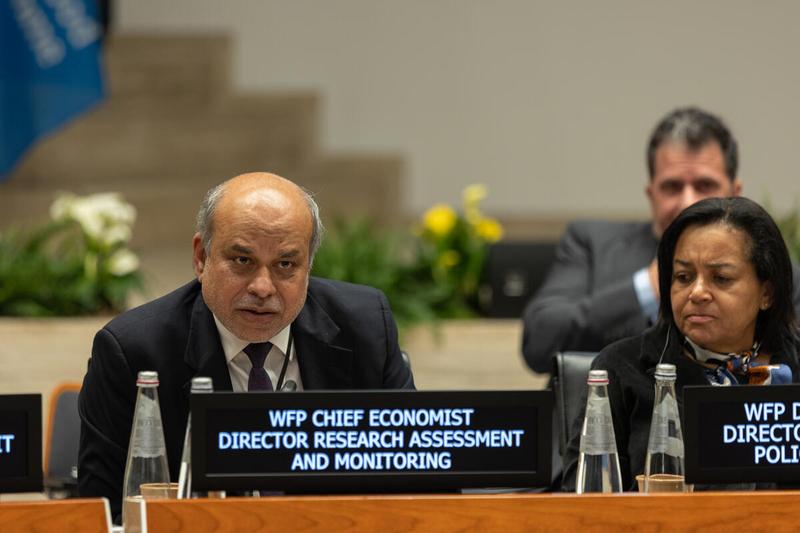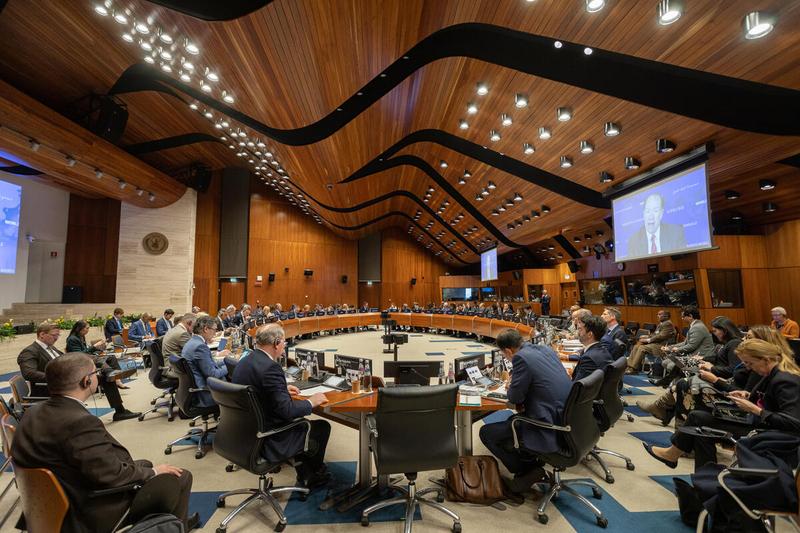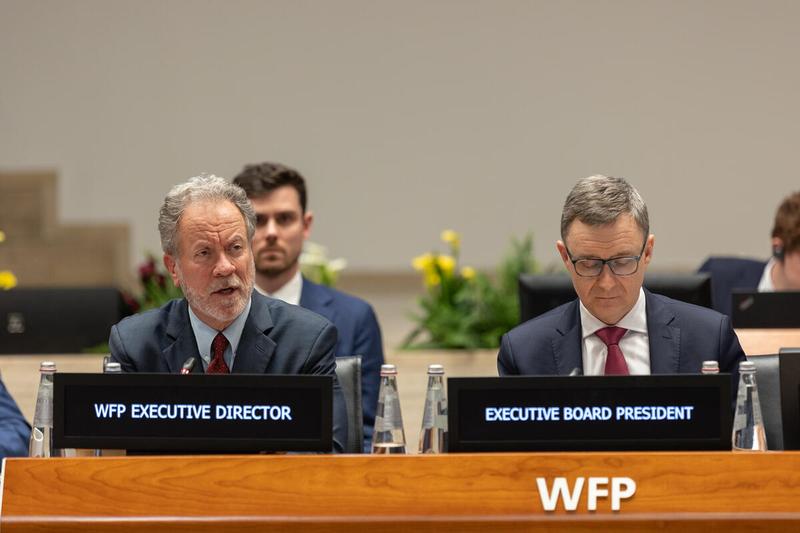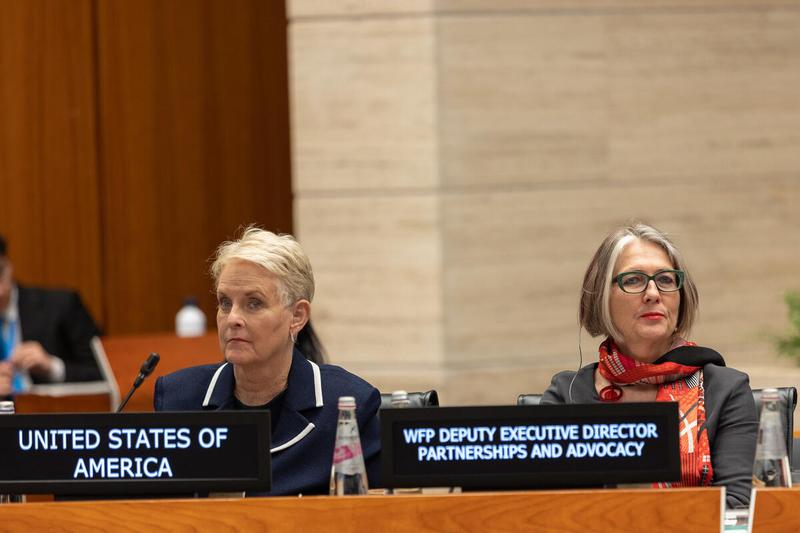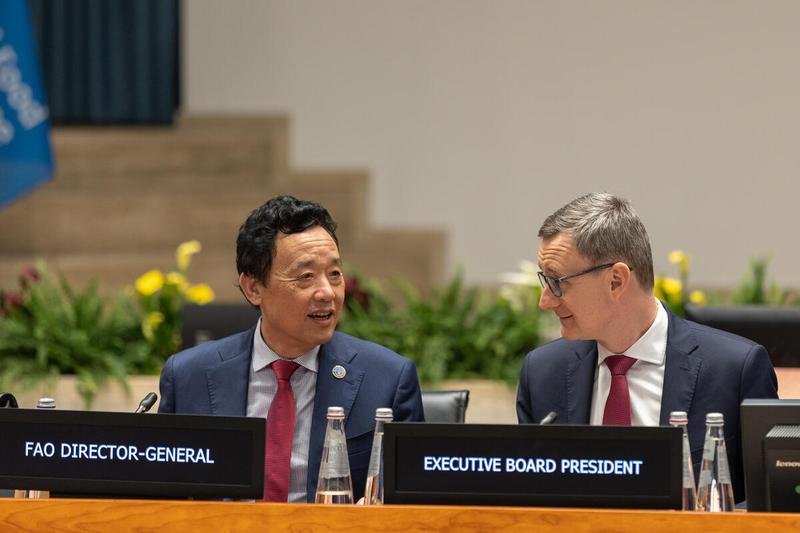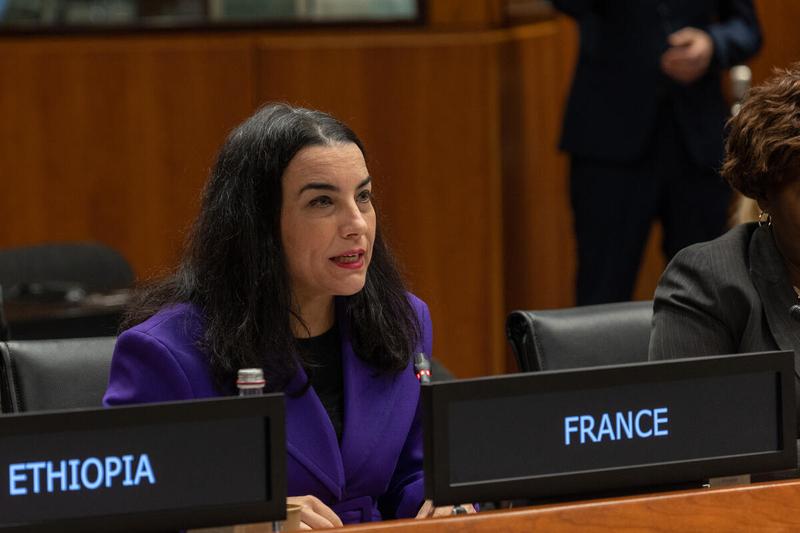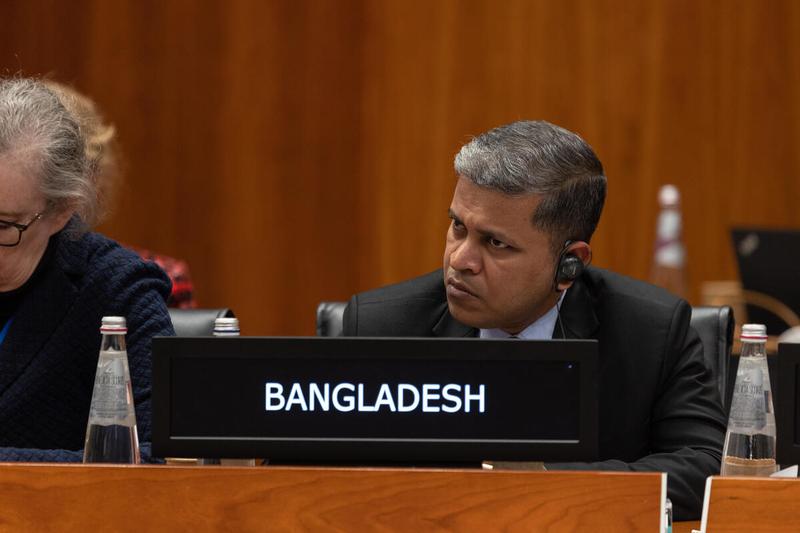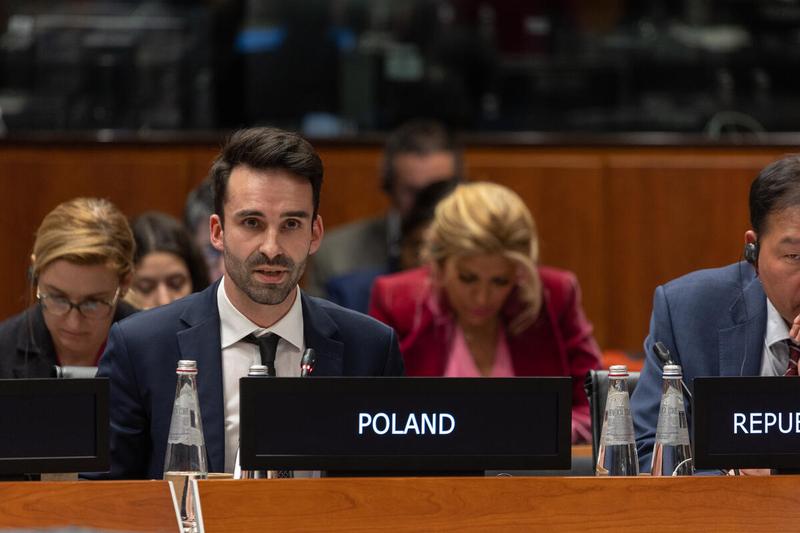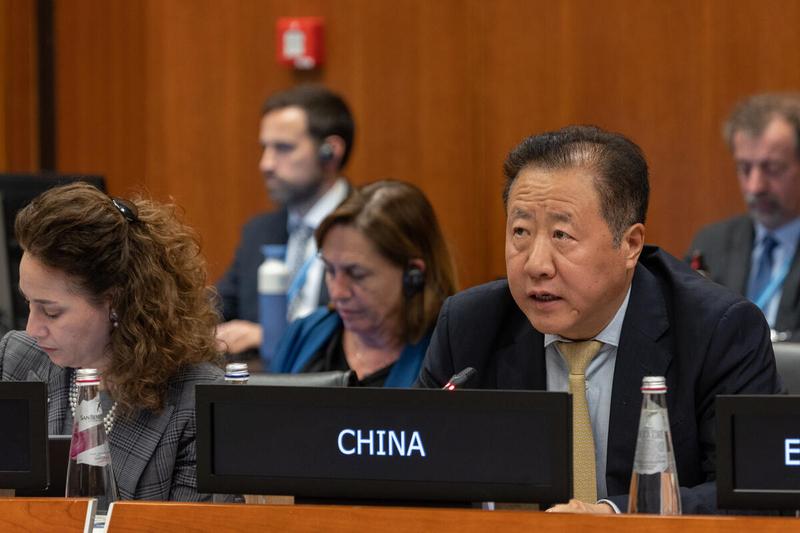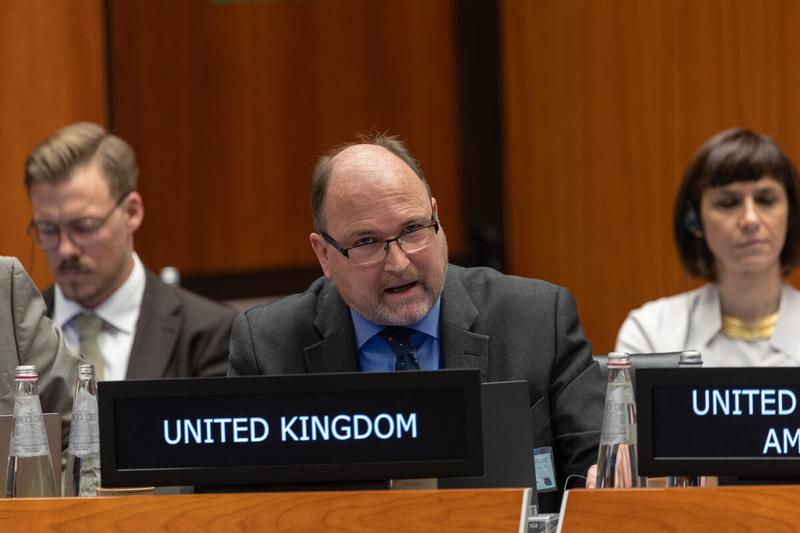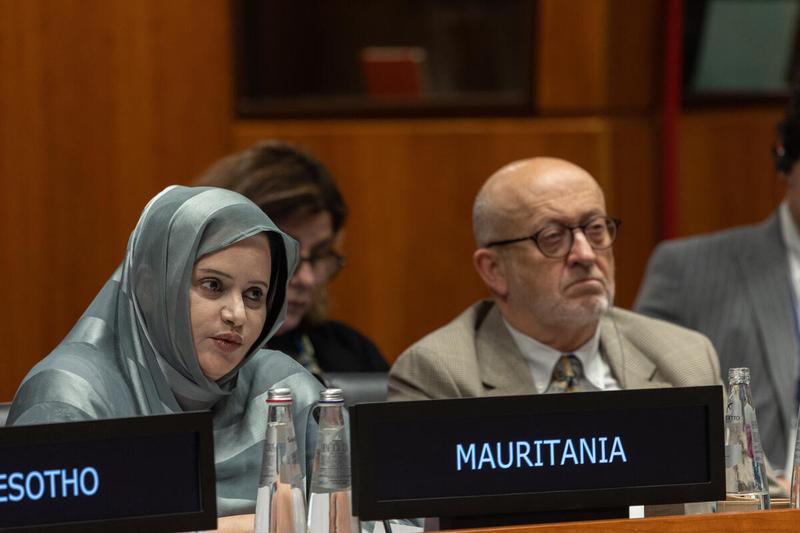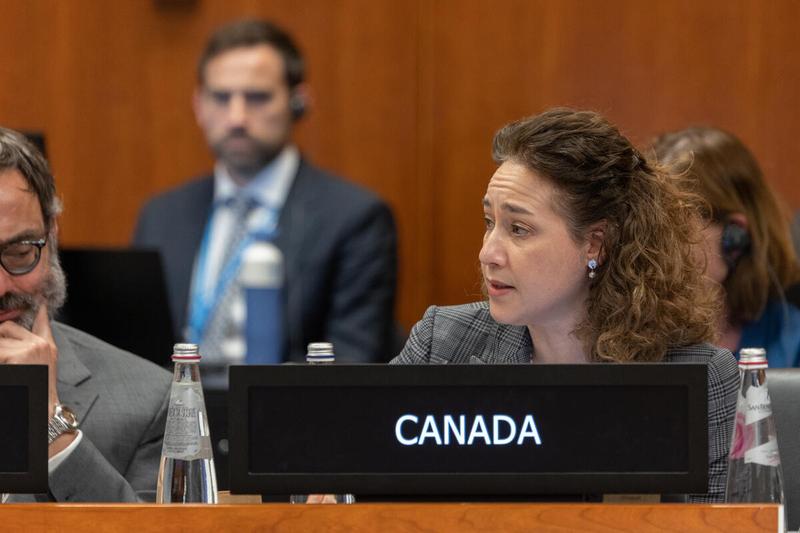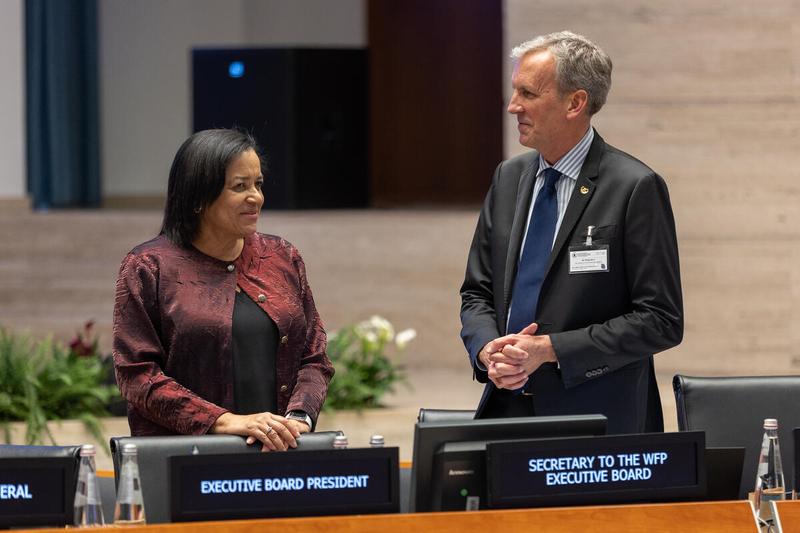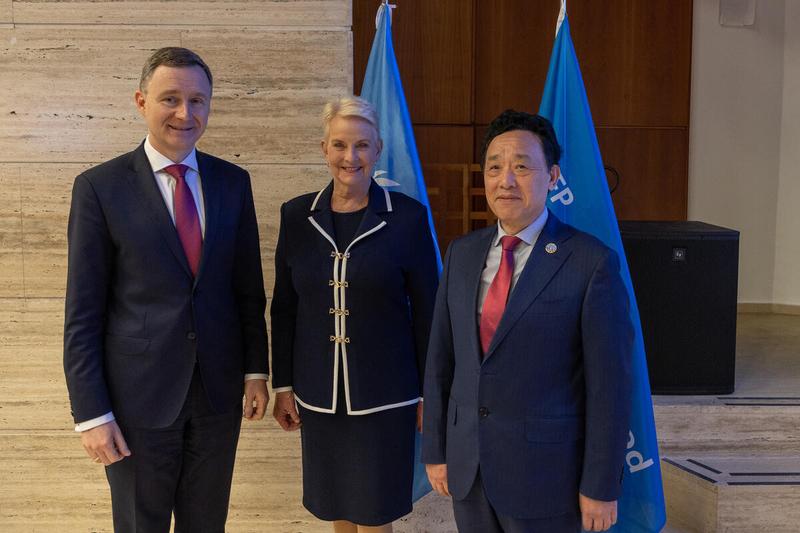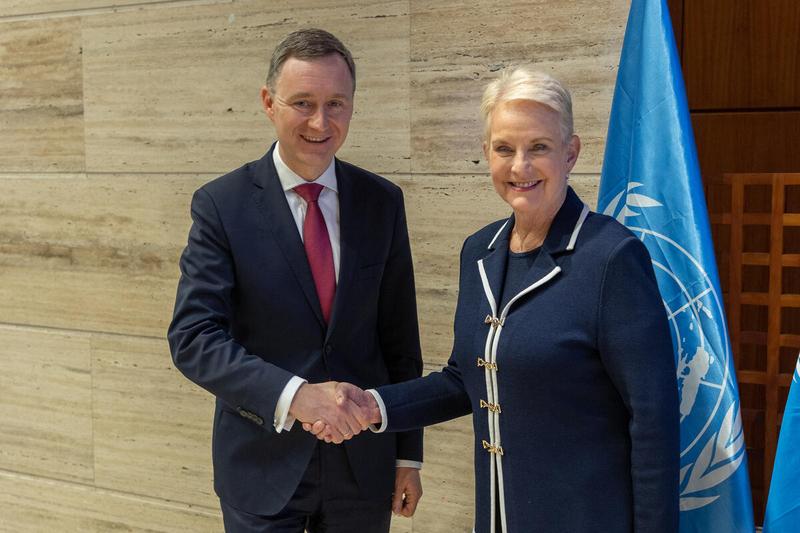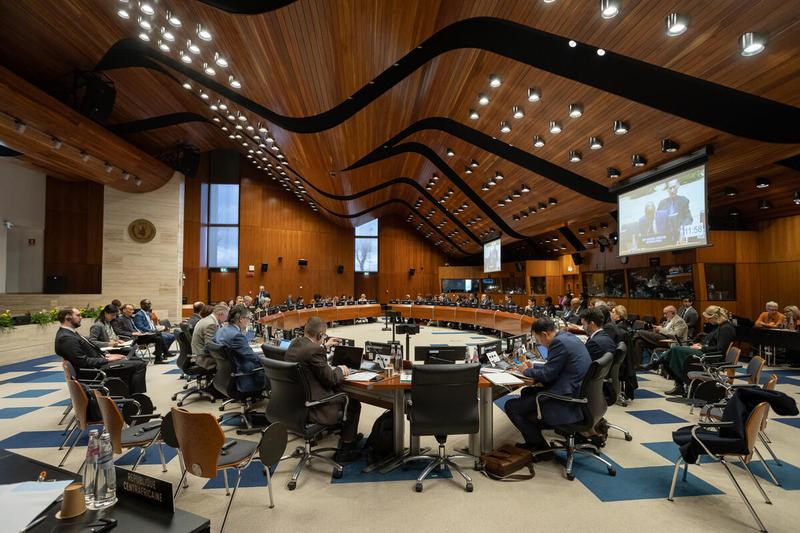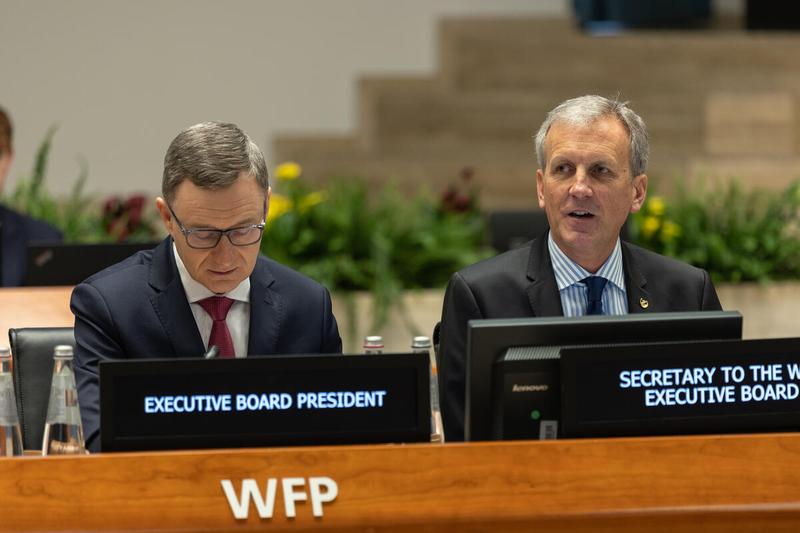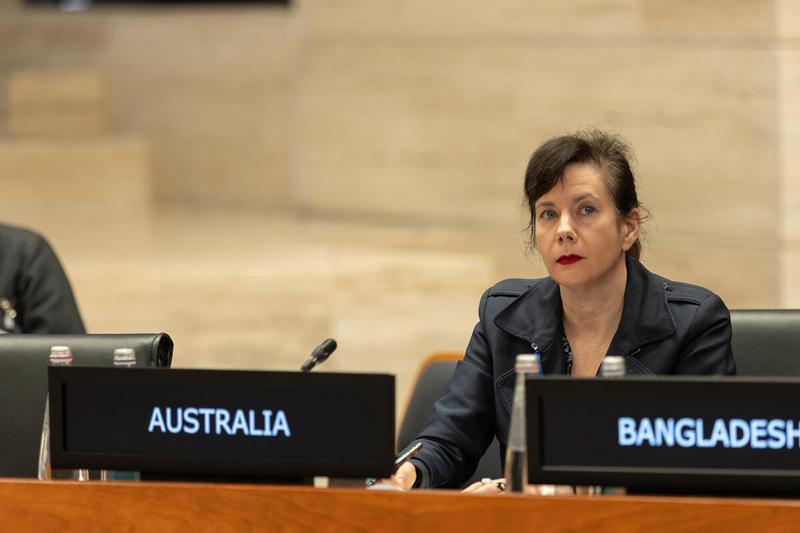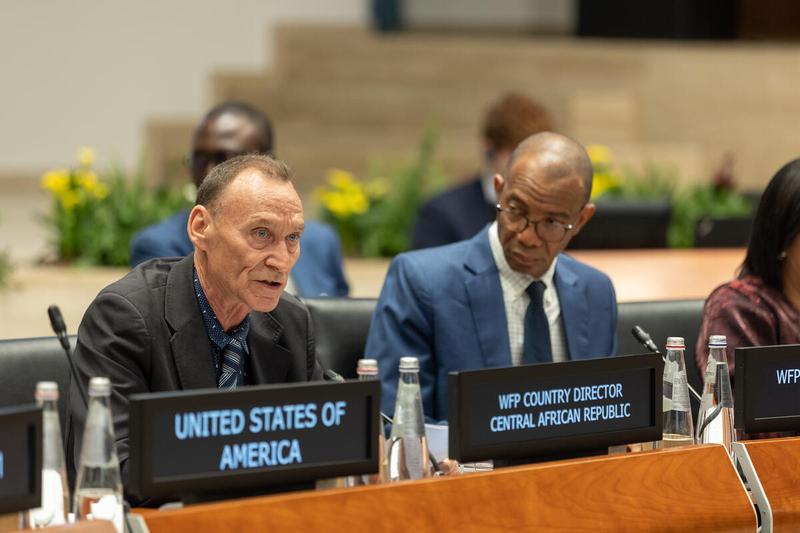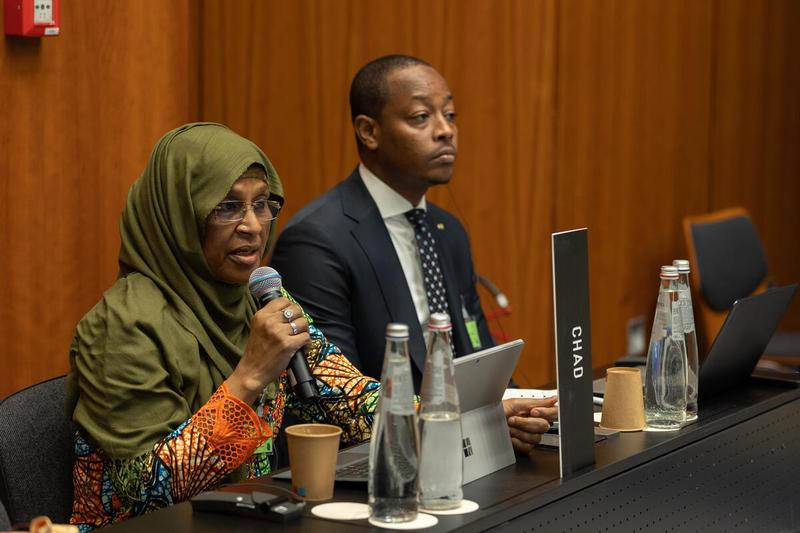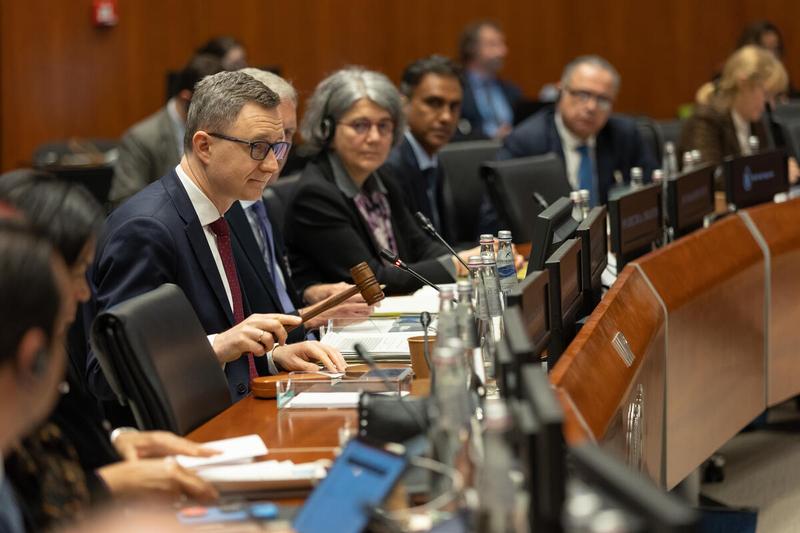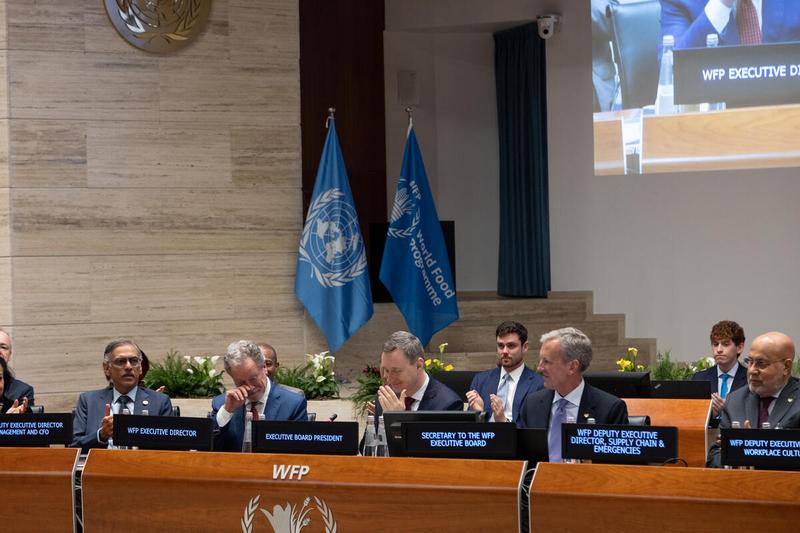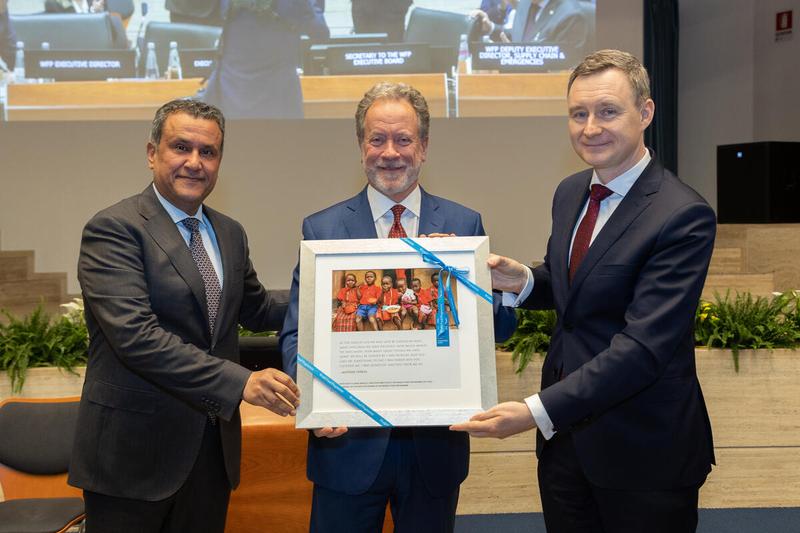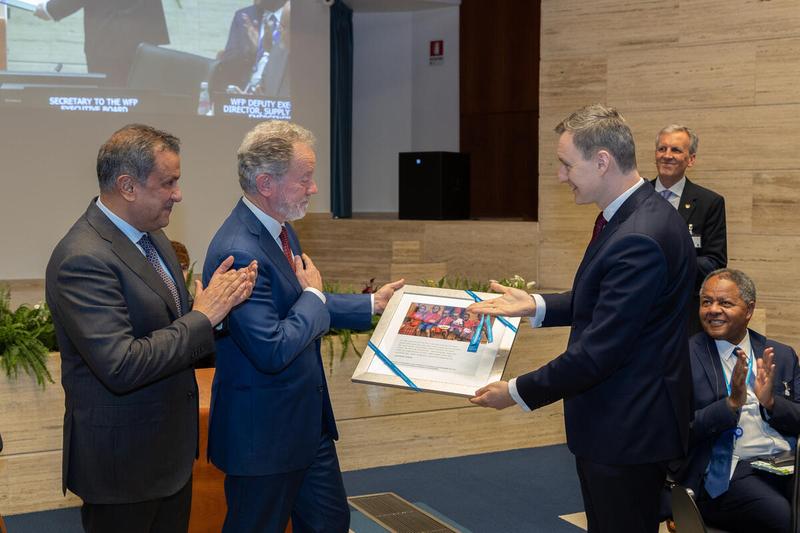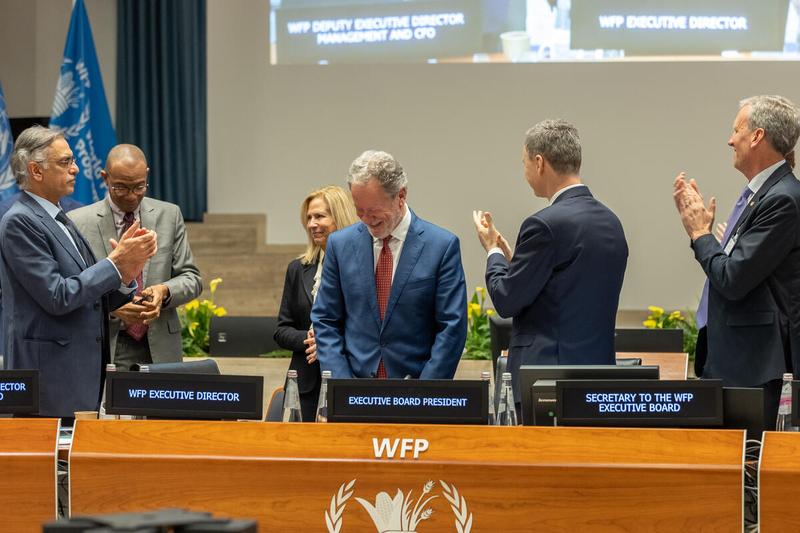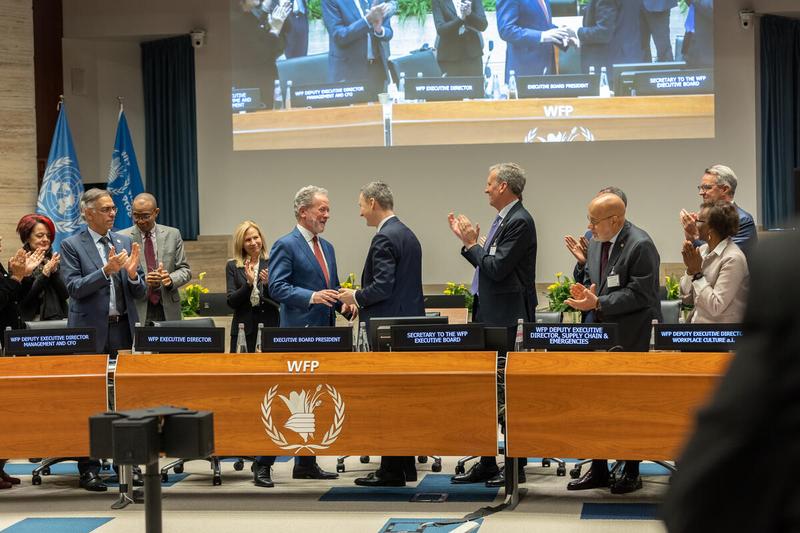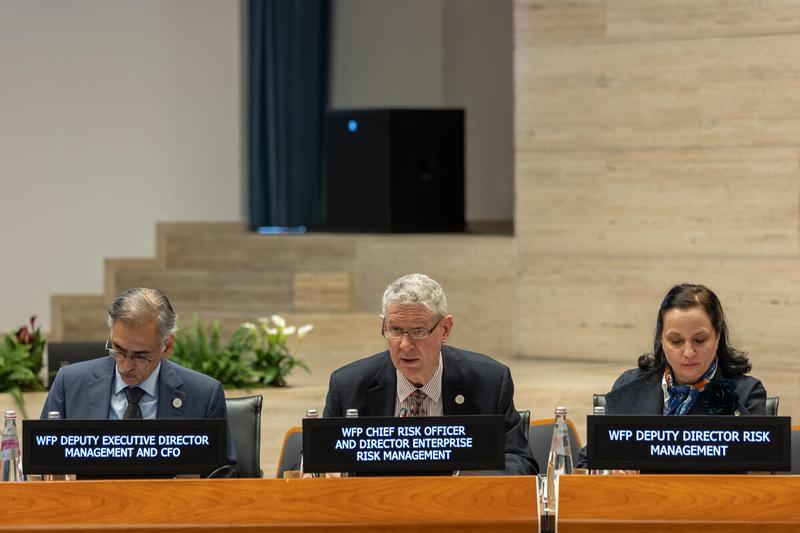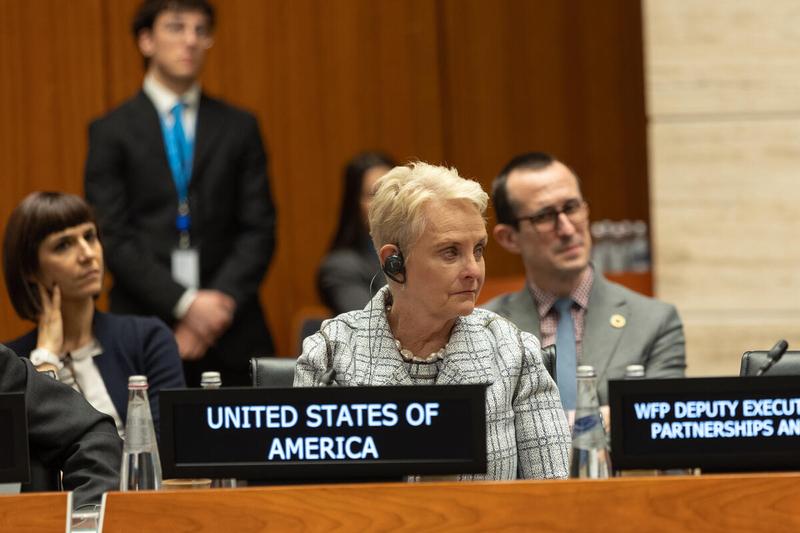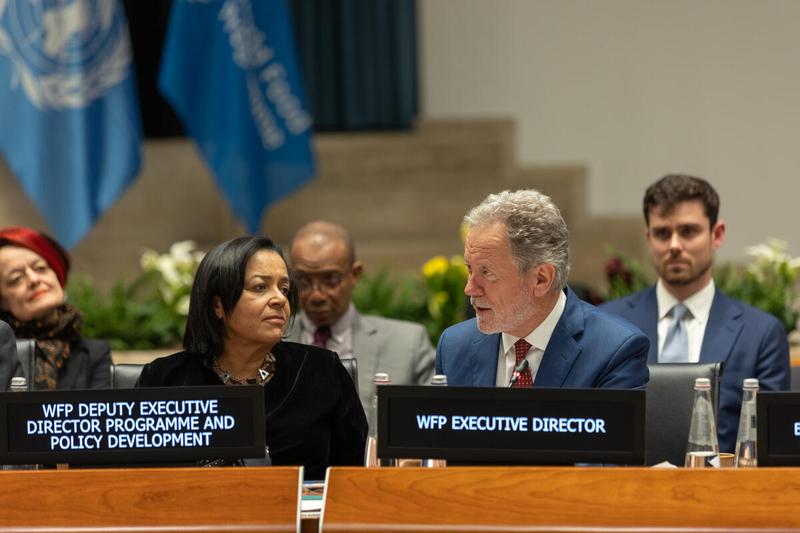The World Food Programme held the 2023 First Regular Session of the Executive Board from 27 February to 2 March. The session was conducted in a hybrid format with an increased in-person participation of Board members and observes.
The Executive Board elected the new Bureau for 2023.
The Membership thanked the outgoing President of the Executive Board, His Excellency Shameem Ahsan, Ambassador and Permanent Representative of Bangladesh, for his leadership and his dedication and contributions to the work of the Executive Board, and welcomed the new President, H.E. Artur Andrzej Pollok, Ambassador and Permanent Representative of Poland, and H.E. Mr. Youssef Balla, Ambassador and Permanent Representative of Morocco, as Vice-President.
In his first speech as President of the Board, H.E. Artur Andrzej Pollok, thanked the Membership for electing him and expressed his deep honour and commitment to support the Board and to help WFP to deliver on its mandate to save and change lives.
In his opening remarks, David Beasley conveyed his gratitude to the Board for the support received during his tenure as Executive Director of the World Food Programme.
Mr Beasley emphasized the work of men and women, often putting their lives at risk, to help bring stability and peace around the world.
The Executive Director underlined WFP’s tireless work during the global lockdown due to the COVID-19 outbreak, and the great support to the global humanitarian community by providing transport to humanitarian and healthcare workers, scientists, doctors and supplies to 173 nations, as well as the WFP response following the conflict in Ukraine and the support provided in the context of the Black Sea Grain Initiative to ensure the safe export of grain from the port of Odesa at a time when the world was facing a dramatic increase in food prices.
The Executive Director also provided some comparative figures since his arrival in 2017. Among others, Mr Beasley noted the increase in contributions, allowing WFP to increase its funding from USD 5.7 billion in 2017 (16 million per day) to USD 14.4 billion in 2022 (USD 39 million per day). The number of beneficiaries reached by WFP has reached a total of 160 million people, from 82 million in 2017. Local procurement has increased from moving from USD 500 million in 2017 to USD 1.6 billion today. WFP has doubled the number of smallholder farmers that it reaches to 1.4 million. Mr Beasley emphasized how WFP has boosted resilience and provided tools for mitigation of shocks across the world, thus helping people become self-sufficient.
He also highlighted the creation of the Workplace Culture Department to empower and protect the over 23,000 employees that the organization has today, by acting on the WFP values of integrity, collaboration, commitment, humanity, inclusion and resources – quoting some examples of corporate developments such as gender parity, with a growing participation rate of women in WFP global workforce, representing the 42 percent as of December 2022; in terms of diversity, the increase of international African employees from 24 percent to 29 percent; and the contract conversion exercise, increasing long-term contracts from 39 to 50 percent.
The Executive Director concluded his speech by quoting Winston Churchill famous lines – “It was the people who had the courage of a lion. I simply had the luck to give the roar.” – and thanked the Membership for the privilege and the honour that they accorded to him “to roar” on their behalf.
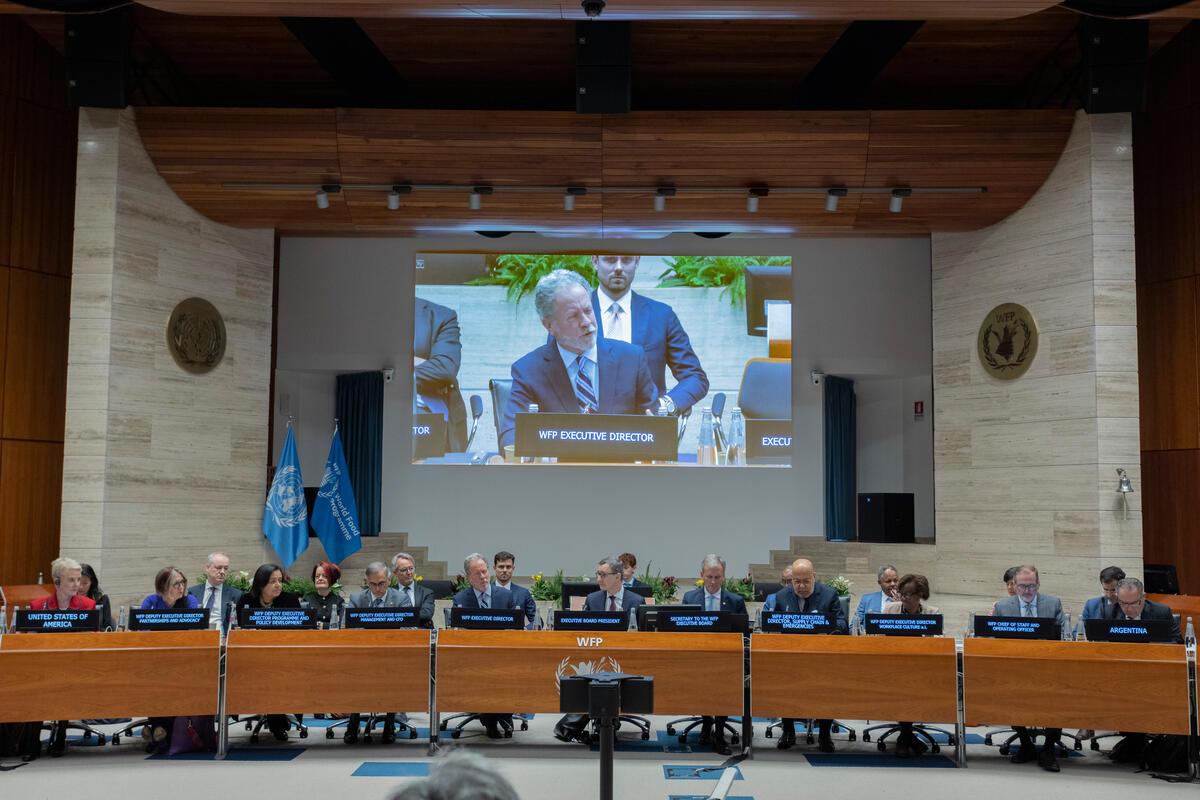
Opening remarks of the Executive Director. David Beasley: “Look back with gratitude, look forward with hope”. © WFP/Massimo Tartaglia
Following the opening remarks, the membership expressed appreciation to the Executive Director for his tireless efforts in leading the organization and for his outstanding commitment to save lives and change lives.
The Board approved the “WFP aviation policy” and six second generation country strategic plans – Central African Republic (2023–2027), Islamic Republic of Iran (2023–2025), Libya (2023–2025), Nigeria (2023–2027), State of Palestine (2023–2028) and Bolivarian Republic of Venezuela (2023–2025).
Documents submitted for consideration included 18 evaluation reports, of which 6 summary evaluation reports on country strategic plans and their management responses – Algeria (2019–2022), Central African Republic (2018–2022), Chad (2019–2023), Mauritania (2019–2023), Nigeria (2019–2022) and State of Palestine (2018–2022).
Initially scheduled to last three and a half days, the EB session was extended until Thursday afternoon to hold the Special session of the Executive Board on the appointment of the Executive Director on Wednesday 1 March, where the Executive Board welcomed the appointment of H.E. Cindy McCain as the next Executive Director of the World Food Programme.
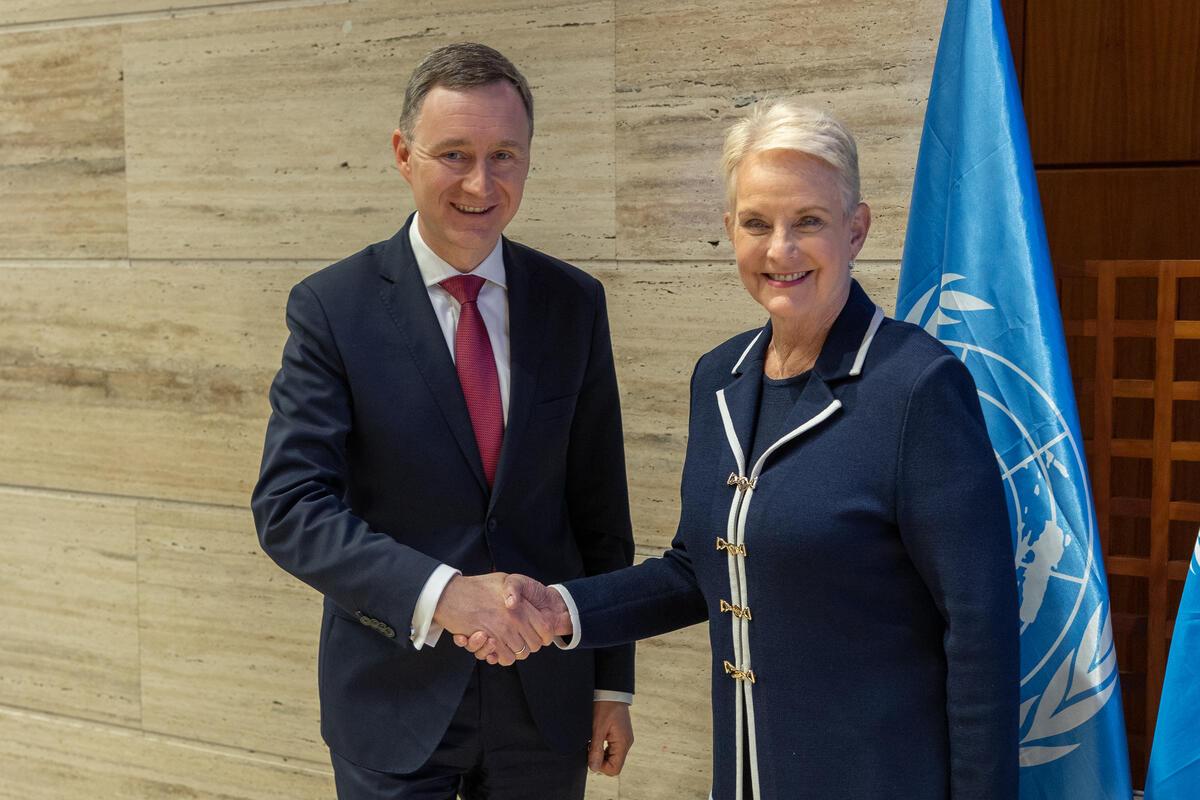
Special session of the Executive Board on the appointment of the Executive Director. H.E. Cindy McCain with the President of the Executive Board, H.E. Artur Andrzej Pollok. © WFP/Massimo Tartaglia
The first day was marked by a special event to celebrate WFP’s 60th anniversary and commemorate the work of the WFP over the past 60 years. The event was held after the morning session with the Membership and with the participation of WFP Alumni, represented by the Alumni Coordination Committee Chairman, Mr Mohamed Saleheen, who has served WFP for over 36 years as humanitarian and development worker.
At the opening of the session a video was presented to celebrate WFP’s impressive work across the past 60 years as the world's largest humanitarian organization saving lives in emergencies and changing lives by using food assistance.
Below you can see the tribute video to celebrate WFP’s 60th anniversary:
A commemoration wall was set up illustrating the timeline of major historical events and WFP achievements as frontline agency since the constitution of the organization, from 1963, until today.
“What began with the world needing a global system for providing food aid has grown into the world's largest humanitarian organization, saving lives in emergencies and using food assistance to build a pathway to stability and prosperity for people recovering from conflict, disasters and the impact of climate change.”
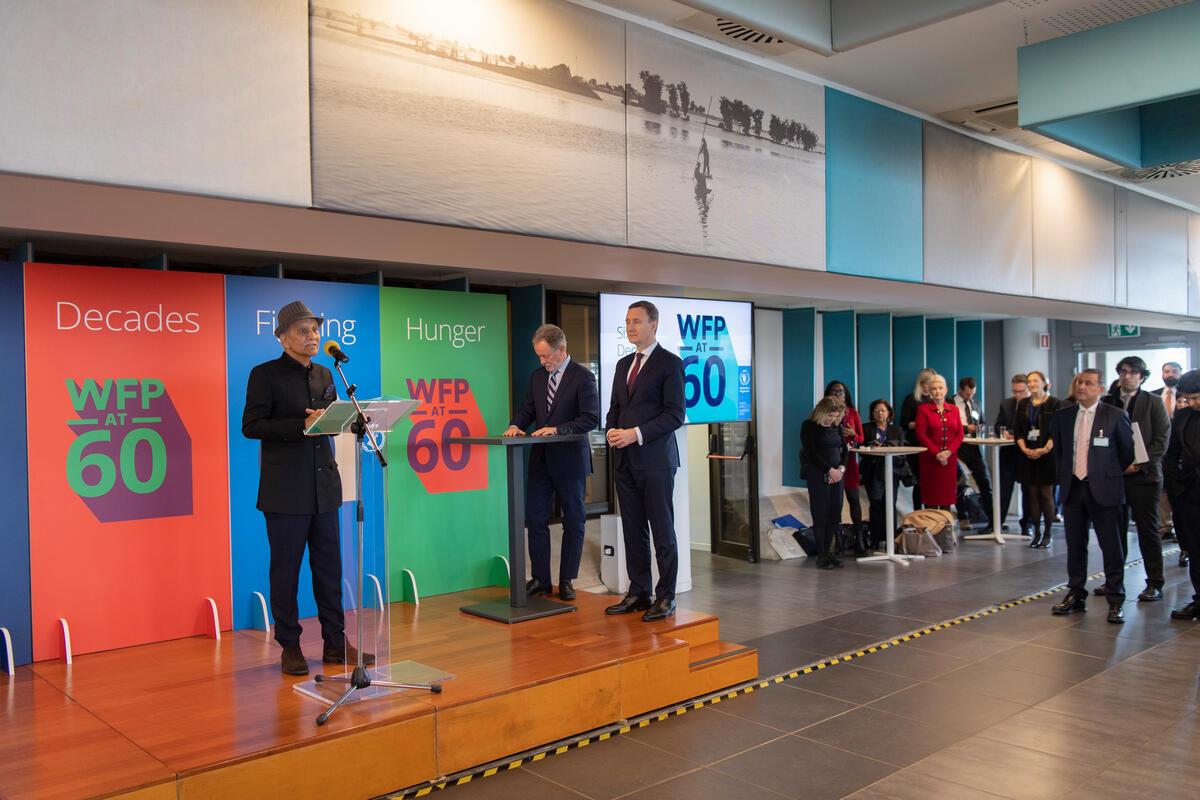
WFP’s 60th Anniversary. Intervention of Mr Mohamed Saleheen, Alumni Coordination Committee Chairman. © WFP/Rein Skullerud
The morning session of Thursday, 2 March, ended with an event to celebrate the Executive Director, whose mandate will end on April 4.
The President of the Board spoke on behalf the Executive Board, expressing deep appreciation for David Beasley’s humanitarian leadership, achievements and how remarkable his commitment was over the past six years. The President underlined that his tenure had coincided with the most turbulent period of the modern history. “You have positioned WFP as a global voice for the most vulnerable and key instrument of the international community to respond in saving and changing lives” said H.E. Artur Andrzej Pollok.
A farewell video was shown at the event. It included images of David Beasley’s missions around the world during his tenure as Executive Director and touching messages from world leaders, colleagues, counterparts and partners. Among many others, Antonio Guterres, Secretary General of the United Nations, Emmanuel Macron, President of the Republic of France, Mia Mottley, Prime Minister of Barbados, Antony Blinken, USA Secretary of State, Qu Dongyu, Director General of FAO, Alvaro Lario, President of IFAD, Catherine Russell, President of UNICEF, Martin Griffiths, Under-Secretary-General for Humanitarian Affairs and Emergency Relief Coordinator, Kristalina Georgieva, Managing Director of the IMF and Ban Ki-Moon, Former UN Secretary General.
The Membership expressed deep appreciation to the Executive Director for his remarkable leadership, highlighting his achievements in positioning WFP to respond effectively during the largest crisis in modern history and recalling all his accomplishments, including his role in WFP receiving the Nobel Peace Prize in 2021.
After the statements delivered by the representatives of the Lists of States, Mr Beasley was given a symbolic gift by the President of the Board and Mr Yousef Jhail, President of the Executive Board in 2017 when the Executive Director first took office.
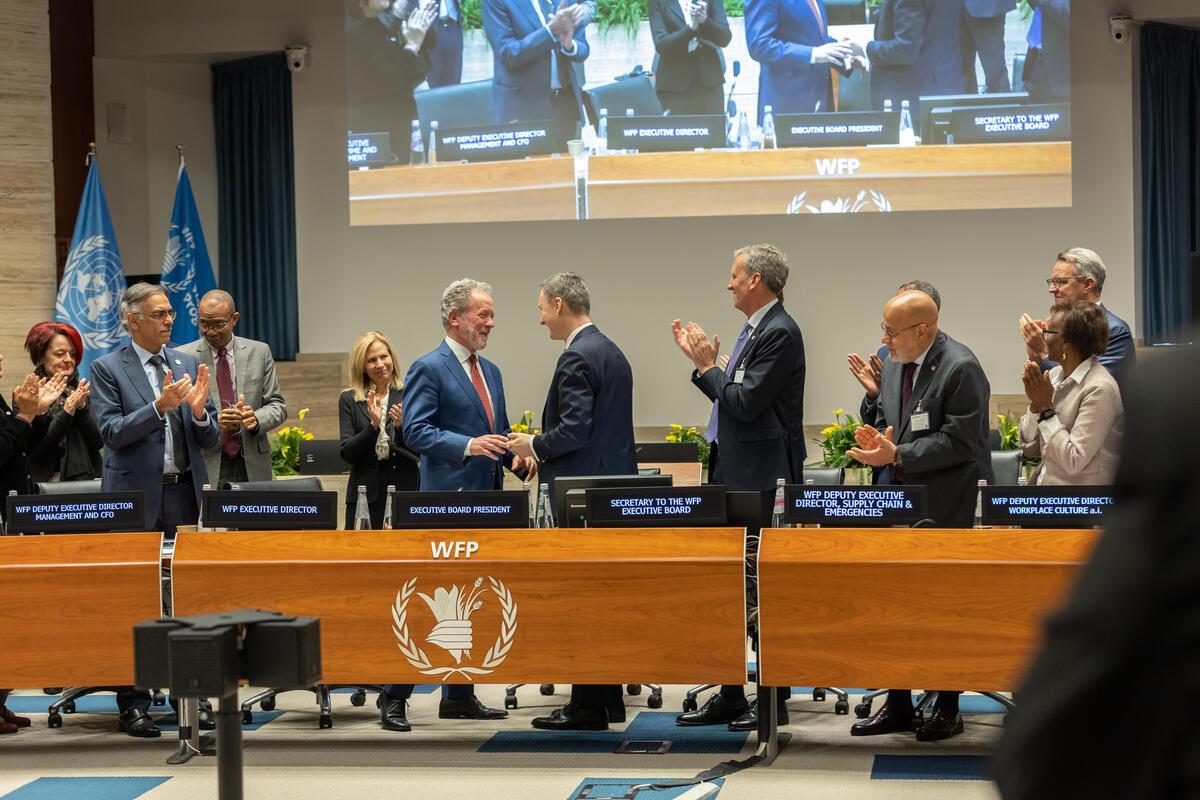
Event to honour the Executive Director of World Food Programme, David Beasley. © WFP/Massimo Tartaglia
Special address by the UNEP Executive Director, Ms Inger Andersen
On Tuesday morning, Ms Inger Andersen, the Under-Secretary-General of the United Nations and Executive Director of the UN Environment Programme, delivered a special address on the triple planetary crisis facing humanity – climate change, nature and biodiversity loss and pollution and waste – and the critical need to build long-term resilience of people and communities.
Ms Andersen spoke about the collaboration between UNEP and WFP and how to strengthen the joint work by investing in the foundations of human and planetary resilience, remarking on the huge country presence and massive operational capability of WFP and the expertise in science, environment, climate, pollution, biodiversity and nature-centered solutions of UNEP.
According to Ms Andersen, there are three areas behind which UNEP and WFP can unite:
- Resilience and adaptation through investments in nature-based solutions and early warning systems.
- Nature-positive, climate friendly food systems.
- Integrated water resource management.
Ms Andersen concluded that, “If we work more closely together, we can create real, meaningful impact. We can enhance climate mitigation and adaptation. We can support vulnerable populations to address nature-induced conflicts and natural disasters. We can maintain healthy, productive and resilient ecosystems. We can, ultimately, deliver on both our mandates and reduce the vicious cycle of humanitarian crises.”
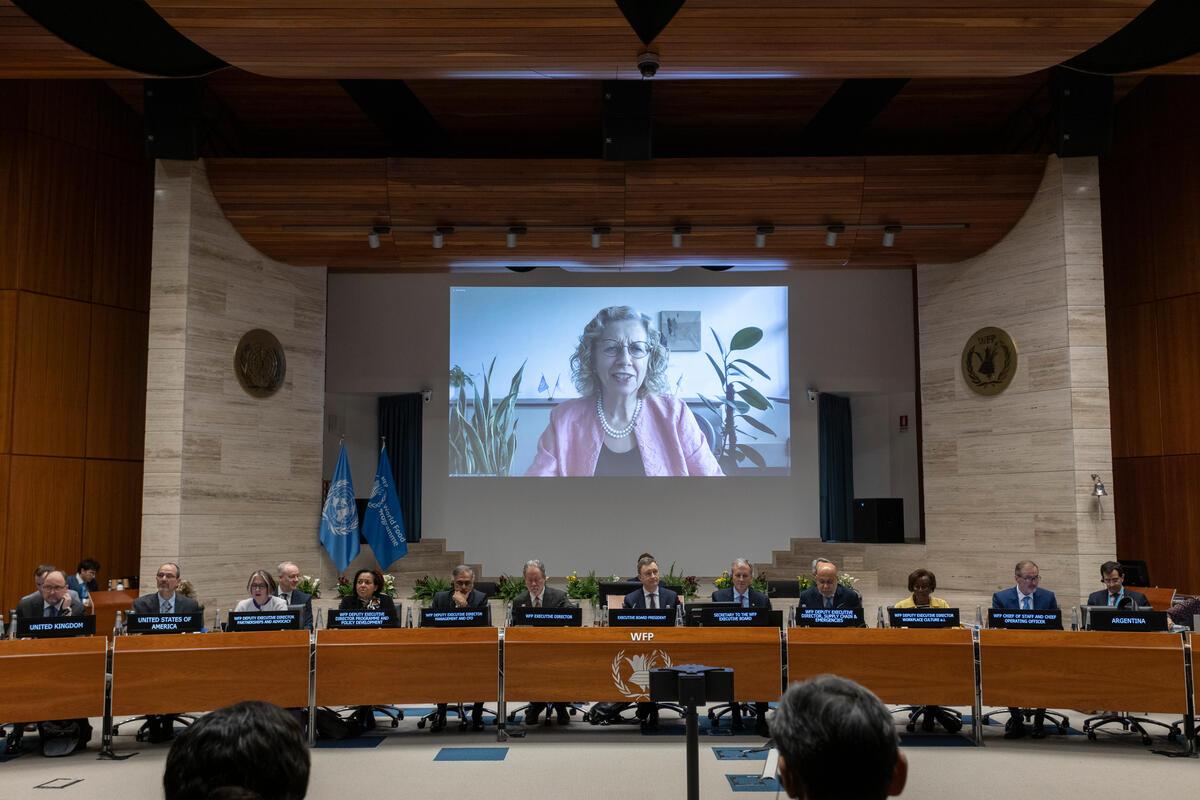
Special address by the UNEP Executive Director, Ms Inger Andersen. © WFP/Massimo Tartaglia
Special address by the President of the World Bank Group, Mr David Malpass
On Wednesday afternoon, Mr David Malpass, President of the World Bank Group (WBG), joined the Board session from Washington to deliver a special address on the collaboration between the WBG and the WFP.
Among other data, he showcased the World Bank Group response to the global food security crisis, which has significantly increased investments to strengthen food security in countries around the world, especially in fragile, conflict-affected and vulnerable settings.
Mr Malpass also remarked on the valued partnership of WFP for the World Bank Group and the work of WFP on the frontlines to address food insecurity and support the livelihoods of families trapped in poverty. To conclude, the President of the WBG ended his address to the membership with a call to new ways to deepen the partnership with WFP.
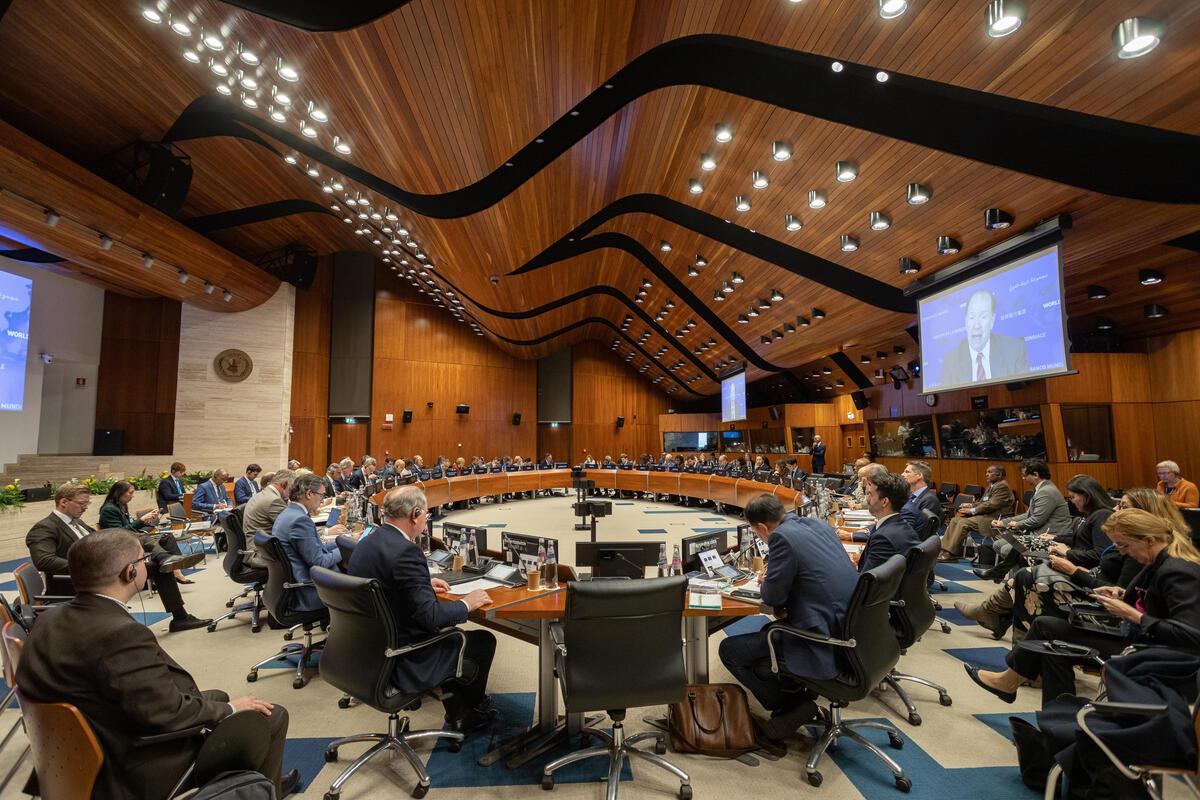
Special address by the President of the World Bank Group, Mr Malpass. © WFP/Massimo Tartaglia
See the background notes of high-level events here, under the “High-level events” tab.
The multi-media exhibition “Beyond the crises: how Sahelian communities boost their resilience - Results from the ground and sky” was officially launched on Tuesday morning, 28 February.
The exhibition, which displayed WFP achievements on resilience in areas that are difficult to access and are largely underreported – used high-quality photo and video material to tell captivating personal stories, as well as drone shots and satellite imagery showing large-scale land transformation. The Members of the Board could also step into a WFP resilience site with the WFP’s latest virtual reality productions.
Two side events were held on the margins of the Board session at the Auditorium in hybrid format.
On Tuesday, 28 February, the Government of the United States sponsored the joint side event by the Gender Equality Office and the Cash-based Transfers Division “Her Money. Her Account. Her Future.”, moderated by Brenda Behan, WFP’s Director of the Gender Equality Office.
The event focused on digital financial inclusion and women’s economic empowerment through cash transfers and provided experiences of women and men who champion women’s digital financial inclusion in their communities in Uganda.
The panelists showcased the learnings from several WFP humanitarian cash operations on how to respond to crisis, as well as some reflections on how women can be supported to overcome the barriers they encounter on their journey to digital financial inclusion.
“Digital financial inclusion and women's economic empowerment has become a strategic priority for WFP, which is reflected in the Strategic Plan, Gender Policy and will be the pinnacle of the upcoming WFP cash policy” said Edith Heines, Director of the Cash-based Transfers Division.
The second side event “Celebrating the 8th African Day of School Feeding: Preview of the State of School Feeding Worldwide 2022 Report” took place on Wednesday, 1 March.
The event was moderated by Valerie Guarnieri, Deputy Executive Director and Director of Programme and Policy Development Department, and had as objectives:
- Review the state of school feeding in Africa and discuss home-grown school feeding as a key driver to accelerate development gains, connecting local production and markets to school-based health, nutrition and education interventions.
- Preview the third State of School Feeding Worldwide 2022 Report, which will be released in March 2023, availing a wealth of new data and research insights to empower stakeholders to advance the school feeding agenda.
- Showcase the early successes of the School Meals Coalition and work on next steps for the implementation of the global school feeding agenda.
Further information regarding these side events is available here, under the “Side Events and Exhibitions” tab.

